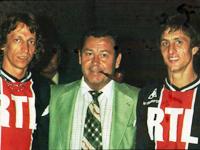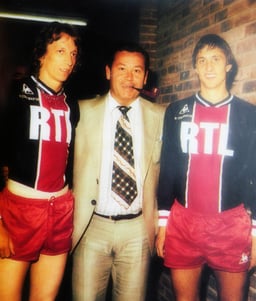Johan Cruyff
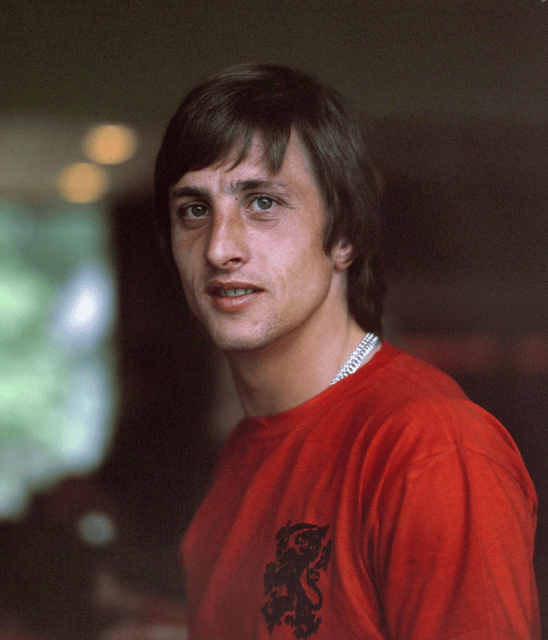
Johan Cruyff

| Personal information | |||||||||||||
|---|---|---|---|---|---|---|---|---|---|---|---|---|---|
| Full name | Hendrik Johannes Cruyff | ||||||||||||
| Date of birth | (1947-04-25)25 April 1947 | ||||||||||||
| Place of birth | Amsterdam, Netherlands | ||||||||||||
| Date of death | 24 March 2016(2016-03-24)(aged 68) | ||||||||||||
| Place of death | Barcelona, Spain | ||||||||||||
| Height | 1.78 m (5 ft 10 in)[1] | ||||||||||||
| Playing position |
| ||||||||||||
| Youth career | |||||||||||||
| 1957–1963 | Ajax | ||||||||||||
| Senior career* | |||||||||||||
| Years | Team | Apps | (Gls) | ||||||||||
| 1964–1973 | Ajax | 240 | (190) | ||||||||||
| 1973–1978 | Barcelona | 143 | (48) | ||||||||||
| 1978–1979 | Los Angeles Aztecs | 23 | (13) | ||||||||||
| 1979–1981 | Washington Diplomats | 30 | (12) | ||||||||||
| 1981 | Levante | 10 | (2) | ||||||||||
| 1981–1983 | Ajax | 36 | (14) | ||||||||||
| 1983–1984 | Feyenoord | 33 | (11) | ||||||||||
| Total | 514 | (290) | |||||||||||
| National team | |||||||||||||
| 1966–1977 | Netherlands | 48 | (33) | ||||||||||
| Teams managed | |||||||||||||
| 1985–1988 | Ajax | ||||||||||||
| 1988–1996 | Barcelona | ||||||||||||
| 2009–2013 | Catalonia | ||||||||||||
Honours
| |||||||||||||
| |||||||||||||
Hendrik Johannes Cruijff OON (Dutch: [ˈjoːɦɑn ˈkrœyf] (listen), internationally spelled Cruyff; 25 April 1947 – 24 March 2016) was a Dutch professional football player and coach. As a player, he won the Ballon d'Or three times, in 1971, 1973, and 1974.[2] Cruyff was an exponent of the football philosophy known as Total Football explored by Rinus Michels, and is widely regarded as one of the greatest players in football history.[3][4][5][6] In the late 1960s and early 1970s, Dutch football rose from obscurity to become a powerhouse in the sport.[7][8][9] Cruyff led the Netherlands to the final of the 1974 FIFA World Cup and received the Golden Ball as player of the tournament.[10] At the 1974 finals, he executed a feint that subsequently was named after him, the "Cruyff Turn", a move widely replicated in the modern game.[11] Wearing the number 14 jersey, he set a trend for wearing shirt numbers outside the usual starting line-up numbers of one to eleven.[10]
At club level, Cruyff started his career at Ajax, where he won eight Eredivisie titles, three European Cups and one Intercontinental Cup.[12] In 1973, he moved to Barcelona for a world record transfer fee, winning La Liga in his first season and was named European Footballer of the Year. After retiring from playing in 1984, Cruyff became highly successful as manager of Ajax and later Barcelona; he remained an influential advisor to both clubs. His son Jordi also played football professionally.
In 1999, Cruyff was voted European Player of the Century in an election held by the International Federation of Football History & Statistics, and came second behind Pelé in their World Player of the Century poll.[13] He came third in a vote organised by the French magazine France Football consulting their former Ballon d'Or winners to elect their Football Player of the Century.[14] He was chosen on the World Team of the 20th Century in 1998, the FIFA World Cup Dream Team in 2002, and in 2004 was named in the FIFA 100 list of the world's greatest living players.[15]
Considered to be one of the most influential figures in football history,[16][17][18] Cruyff's style of play and his football philosophy has influenced managers and players, including the likes of Arrigo Sacchi, Sir Alex Ferguson, Arsène Wenger, Pep Guardiola, Frank Rijkaard, Michael Laudrup, Eric Cantona, Peter Bosz, Óscar García Junyent and Xavi.[19] Ajax and Barcelona are among the clubs that have developed youth academies based on Cruyff's coaching methods.[20] His coaching philosophy helped lay the foundations for the revival of Ajax's international successes in the 1990s.[21] Spanish football's successes at both club and international level during the years 2008 to 2012 have been cited by many as evidence of Cruyff's impact on contemporary football.[22] France Football ranked him at No. 4 on their list of the Top 50 football managers of all time.[23]
| Personal information | |||||||||||||
|---|---|---|---|---|---|---|---|---|---|---|---|---|---|
| Full name | Hendrik Johannes Cruyff | ||||||||||||
| Date of birth | (1947-04-25)25 April 1947 | ||||||||||||
| Place of birth | Amsterdam, Netherlands | ||||||||||||
| Date of death | 24 March 2016(2016-03-24)(aged 68) | ||||||||||||
| Place of death | Barcelona, Spain | ||||||||||||
| Height | 1.78 m (5 ft 10 in)[1] | ||||||||||||
| Playing position |
| ||||||||||||
| Youth career | |||||||||||||
| 1957–1963 | Ajax | ||||||||||||
| Senior career* | |||||||||||||
| Years | Team | Apps | (Gls) | ||||||||||
| 1964–1973 | Ajax | 240 | (190) | ||||||||||
| 1973–1978 | Barcelona | 143 | (48) | ||||||||||
| 1978–1979 | Los Angeles Aztecs | 23 | (13) | ||||||||||
| 1979–1981 | Washington Diplomats | 30 | (12) | ||||||||||
| 1981 | Levante | 10 | (2) | ||||||||||
| 1981–1983 | Ajax | 36 | (14) | ||||||||||
| 1983–1984 | Feyenoord | 33 | (11) | ||||||||||
| Total | 514 | (290) | |||||||||||
| National team | |||||||||||||
| 1966–1977 | Netherlands | 48 | (33) | ||||||||||
| Teams managed | |||||||||||||
| 1985–1988 | Ajax | ||||||||||||
| 1988–1996 | Barcelona | ||||||||||||
| 2009–2013 | Catalonia | ||||||||||||
Honours
| |||||||||||||
| |||||||||||||
Early life
I was born shortly after the war, though, and was taught not to just accept anything. —Cruyff said in a documentary on TV3 channel (2015).[24]
Hendrik Johannes "Johan" Cruijff was born on 25 April 1947 in Amsterdam, on a street five minutes away from Ajax's stadium, his first football club. Johan was the second son of Hermanus Cornelis Cruijff and Petronella Bernarda Draaijer, from a humble, working-class background in east Amsterdam. Cruyff, encouraged by his influential football-loving father and his close proximity in Akkerstraat to the De Meer Stadium, played football with his schoolmates and older brother, Henny, whenever he could, and idolised the prolific Dutch dribbler, Faas Wilkes.
In 1959, Cruyff's father died from a heart attack. His father's death had a major impact on his mentality. As Cruyff recalled, in celebration of his 50th birthday, "My father died when I was just 12 and he was 45. From that day the feeling crept stronger over me that I would die at the same age and, when I had serious heart problems when I reached 45, I thought: 'This is it.' Only medical science, which was not available to help my father, kept me alive."[25] Viewing a potential football career as a way of paying tribute to his father, the death inspired the strong-willed Cruyff, who also frequently visited the burial site at Oosterbegraafplaats.[26] His mother began working at Ajax as a cleaner, deciding that she could no longer carry on at the grocer without her husband, and in the future, this made Cruyff near-obsessed with financial security but also gave him an appreciation for player aids. His mother soon met her second husband, Henk Angel, a field hand at Ajax who proved a key influence in Cruyff's life.[27]
Playing career
Club career
Ajax and the golden era of Total Football
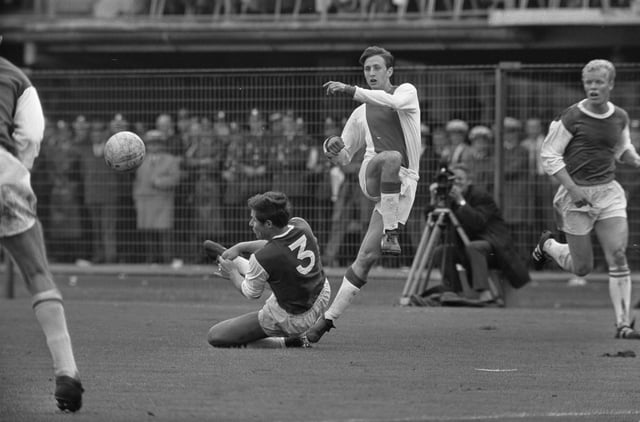
Cruyff was instrumental in Ajax's dominance of European football in the early 1970s. He played for Ajax from 1957 to 1973 and 1981 to 1983 (seen here in 1967 against Feyenoord).

Cruyff playing for Ajax taking on Liverpool defender Tommy Smith in a European Cup game in December 1966
Cruyff joined the Ajax youth system on his tenth birthday. Cruyff and his friends would frequent a "playground" in their neighbourhood and Ajax youth coach Jany van der Veen, who lived close by, noticed Cruyff's talent and decided to offer him a place at Ajax without a formal trial.[26] He showed talent both on the pitcher's mound and behind the plate, as a catcher, before having to leave the club's baseball section at age 15 to focus on football.[28][29] He made his first team debut on 15 November 1964 in the Eredivisie, against GVAV, scoring the only goal for Ajax in a 3–1 defeat. That year, Ajax finished in their lowest position since the establishment of professional football, in 13th.[30] Cruyff really started to make an impression in the 1965–66 season and established himself as a regular first team player after scoring two goals against DWS in the Olympic stadium on 24 October 1965 in a 2–0 victory. In the seven games that winter, he scored eight times and in March 1966 scored the first three goals in a league game against Telstar in a 6–2 win. Four days later, in a cup game against Veendam in a 7–0 win, he scored four goals. In total that season, Cruyff scored 25 goals in 23 games, and Ajax won the league championship.[10]
In the 1966–67 season, Ajax again won the league championship, and also won the KNVB Cup, for Cruyff's first "double".[10] Cruyff ended the season as the leading goalscorer in the Eredivisie with 33. Cruyff won the league for the third successive year in the 1967–68 season. He was also named Dutch footballer of the year for the second successive time, a feat he repeated in 1969.[10] On 28 May 1969, Cruyff played in his first European Cup final against Milan, but the Italians won 4–1.
In the 1969–70 season, Cruyff won his second league and cup "double"; at the beginning of the 1970–71 season, he suffered a groin injury. He made his comeback on 30 October 1970 against PSV, and rather than wear his usual number 9, which was in use by Gerrie Mühren, he instead used number 14.[10] Ajax won 1–0. Although it was very uncommon in those days for the starters of a game not to play with numbers 1 to 11, from that moment onwards, Cruyff wore number 14, even with the Dutch national team. There was a documentary on Cruyff, Nummer 14 Johan Cruyff[31] and in the Netherlands there is a magazine by Voetbal International, Nummer 14.[32]
Johan Cruyff's miracles in Amsterdam were many. He and his coach Rinus Michels (a sort of John the Baptist figure) raised Ajax from obscurity. More important, they invented a new way of playing. Cruyff became the greatest exponent and teacher of 'totaalvoetbal' [Total Football]. His vision of perfect movement and harmony on the field was rooted in the same sublime ordering of space that one sees in the pictures of Vermeer or church painter Pieter Jansz Saenredam. It was the music of the spheres on grass. —David Winner, the author of Brilliant Orange: The Neurotic Genius of Dutch Football[33]
In a league game against AZ '67 on 29 November 1970, Cruyff scored six goals in an 8–1 victory. After winning a replayed KNVB Cup final against Sparta Rotterdam by a score of 2–1, Ajax won in Europe for the first time. On 2 June 1971, in London, Ajax won the European Cup by defeating Panathinaikos 2–0.[10] He signed a seven-year contract at Ajax. At the end of the season, he was named the Dutch and European Footballer of the Year for 1971.[10]
In 1972, Ajax won a second European Cup, beating Inter Milan 2–0 in the final, with Cruyff scoring both goals.[10] This victory prompted Dutch newspapers to announce the demise of the Italian style of defensive football in the face of Total Football. Soccer: The Ultimate Encyclopaedia says, "Single-handed, Cruyff not only pulled Internazionale of Italy apart in the 1972 European Cup Final, but scored both goals in Ajax's 2–0 win."[34] Cruyff also scored in the 3–2 victory over ADO Den Haag in the KNVB Cup final. In the league, Cruyff was the top scorer with 25 goals as Ajax became champions. Ajax won the Intercontinental Cup, beating Argentina's Independiente 1–1 in the first game followed by 3–0, and then in January 1973, they won the European Super Cup by beating Rangers 3–1 away and 3–2 in Amsterdam. Cruyff's only own goal came on 20 August 1972 against FC Amsterdam. A week later, against Go Ahead Eagles in a 6–0 win, Cruyff scored four times for Ajax. The 1972–73 season was concluded with another league championship victory and a third successive European Cup with a 1–0 win over Juventus in the final, with the Encyclopedia stating Cruyff "inspired one of the greatest 20-minute spells of football ever seen".[34]
Barcelona and the first La Liga title in 14 years
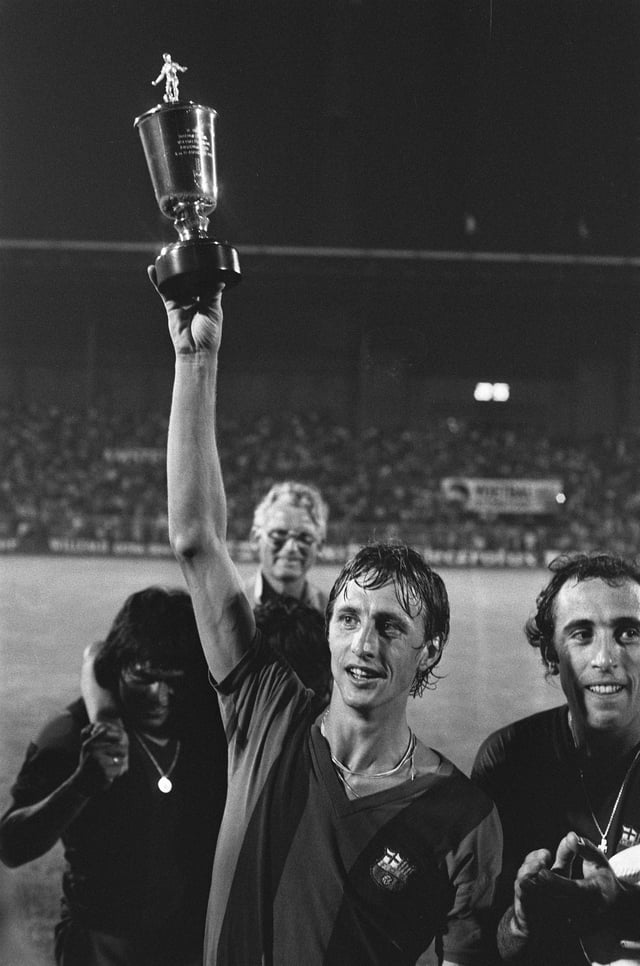
Cruyff played for Barcelona from 1973–1978
Cruyff endeared himself to the Barcelona fans when he chose a Catalan name, Jordi, for his son. He helped the club win La Liga for the first time since 1960, defeating their fiercest rivals Real Madrid 5–0 at their home of the Santiago Bernabéu. Thousands of Barcelona fans who watched the match on television poured out of their homes to join in street celebrations.[38] A New York Times journalist wrote that Cruyff had done more for the spirit of the Catalan people in 90 minutes than many politicians in years of struggle.[38] Football historian Jimmy Burns stated, "with Cruyff, the team felt they couldn't lose".[38] He gave them speed, flexibility and a sense of themselves.[38] In 1974 Cruyff was crowned European Footballer of the Year.[10]
During his time at Barcelona, in a game against Atlético Madrid, Cruyff scored a goal in which he leapt into the air, twisted his body so he was facing away from the goal, and kicked the ball past Miguel Reina in the Atlético goal with his right heel (the ball was at about neck height and had already travelled wide of the far post).[39] The goal was featured in the documentary En un momento dado, in which fans of Cruyff attempted to recreate that moment. The goal has been dubbed Le but impossible de Cruyff (Cruyff's impossible goal).[40] In 1978, Barcelona defeated Las Palmas 3–1, to win the Copa del Rey.[10] Cruyff played two games with Paris Saint-Germain in 1975 during the Paris tournament. He had only agreed because he was a fan of designer Daniel Hechter, who was then president of PSG.[41][42]
Brief retirement and spells in the United States
Cruyff nearly retired in 1978. But after losing most of his money in a series of poor investments, including a pig farm, that were counseled by a scam artist who had possibly seduced his wife, Cruyff and his family came to the United States.[43][44] As he recalled, "I had lost millions in pig-farming and that was the reason I decided to become a footballer again."[25] Cruyff insisted that his decision to resume his playing career in the United States was pivotal in his career. "It was wrong, a mistake, to quit playing at 31 with the unique talent I possessed", and adding that "Starting from zero in America, many miles away from my past, was one of the best decisions I made. There I learned how to develop my uncontrolled ambitions, to think as a coach and about sponsorship."[25]
At the age of 32, Cruyff signed a lucrative deal with the Los Angeles Aztecs of the North American Soccer League (NASL).[10] He had previously been rumoured to be joining the New York Cosmos but the deal did not materialize; he played a few exhibition games for the Cosmos. He stayed at the Aztecs for only one season, and was voted NASL Player of the Year. The following season, he moved to play for the Washington Diplomats. He played the whole 1980 campaign for the Diplomats, even as the team was facing dire financial trouble. In May 1981, Cruyff played as a guest player for Milan in a tournament, but was injured. As a result, he missed the beginning of the 1981 NASL soccer season, which ultimately led to Cruyff choosing to leave the team. Cruyff also loathed playing on artificial surfaces, which were common in the NASL at the time.
Return to Spain with Levante
In January 1981, Cruyff played three friendly matches for FC Dordrecht. Also in January 1981, manager Jock Wallace of English club Leicester City made an attempt to sign Cruyff, and despite negotiations lasting three weeks, in which Cruyff expressed his desire to play for the club, a deal could not be reached. Cruyff instead chose to sign with Spanish Segunda División side Levante.[45]
In March 1981, Cruyff took the field for the first time for Levante. Injuries and disagreements with the administration of the club, however, blighted his spell in the Segunda División, and he only made ten appearances, scoring two goals. Having failed to secure promotion to the first division, a contract with Levante fell through.[46]
Second spell at Ajax
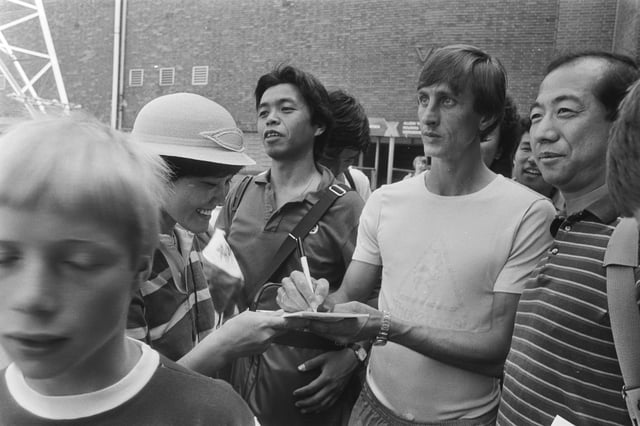
Johan Cruyff with Japanese fans in 1982
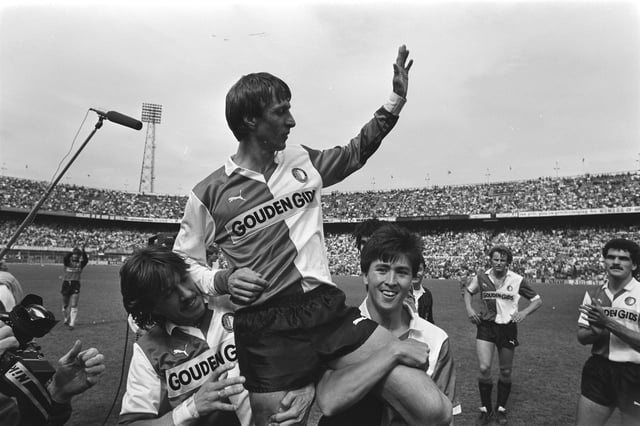
Cruyff's farewell at Feyenoord
After his spell in the U.S. and his short-lived stay in Spain, Cruyff returned to play in his homeland, rejoining Ajax on 30 November 1980 as "technical advisor" to trainer Leo Beenhakker, Ajax being eighth in the league table at the time after 13 games played. After 34 games, however, Ajax finished the 1980–81 season in second. In December 1981, Cruyff signed a contract extension with Ajax.[46]
In the 1981–82 and 1982–83 seasons, Ajax, along with Cruyff, became league champions. In 1982–83, Ajax won the Dutch Cup (KNVB-Beker). In 1982, he scored a famous goal against Helmond Sport. While playing for Ajax, Cruyff scored a penalty the same way Rik Coppens had done it 25 years earlier.[47][48] He put the ball down as for a routine penalty kick, but instead of shooting at goal, Cruyff nudged the ball sideways to teammate Jesper Olsen, who in return passed it back to Cruyff to tap the ball into the empty net, as Otto Versfeld, the Helmond goalkeeper, looked on.[10]
Final season at Feyenoord and retirement
At the end of the 1982–83 season, Ajax decided not to offer Cruyff a new contract. This angered Cruyff, who responded by signing for Ajax's archrivals Feyenoord.[49] Cruyff's season at Feyenoord was a successful one in which the club won the Eredivisie for the first time in a decade, part of a league and KNVB Cup double. The team's success was due to the performances of Cruyff along with Ruud Gullit and Peter Houtman.[50]
Despite his relatively advanced age, Cruyff played all league matches that season except for one. Because of his performance on the field, he was voted as Dutch Footballer of the Year for the fifth time. At the end of the season, the veteran announced his final retirement. He ended his Eredivisie playing career on 13 May 1984 with a goal against PEC Zwolle. Cruyff played his last game in Saudi Arabia against Al-Ahli, bringing Feyenoord back into the game with a goal and an assist.[51]
International career
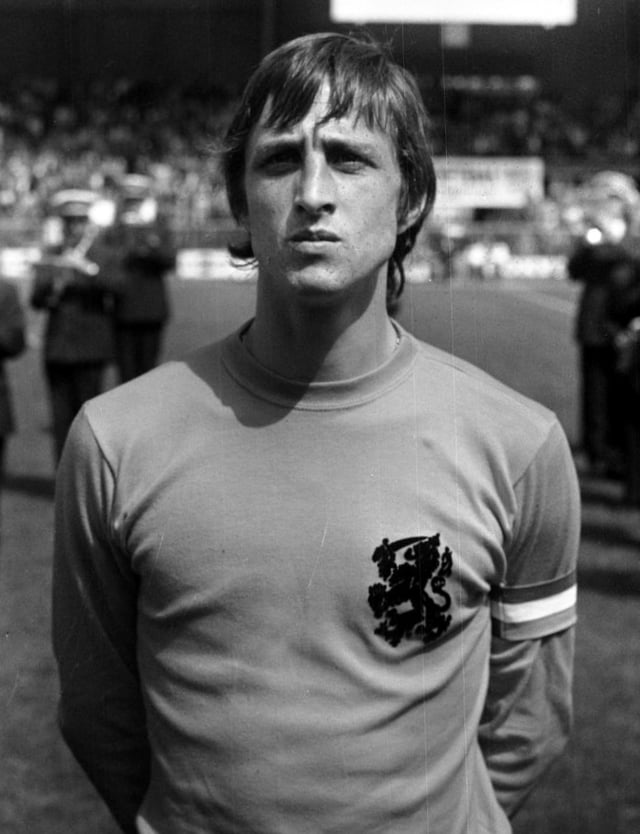
Cruyff as captain of the Netherlands prior to a game at the 1974 World Cup
As a Dutch international, Cruyff played 48 matches, scoring 33 goals.[10][52] The national team never lost a match in which Cruyff scored. On 7 September 1966, he made his official debut for the Netherlands in the UEFA Euro 1968 qualifier against Hungary, scoring in the 2–2 draw. In his second match, a friendly against Czechoslovakia, Cruyff was the first Dutch international to receive a red card. The Royal Dutch Football Association (KNVB) banned him from Ajax games but not internationals.[53]
Accusations of Cruyff's "aloofness" were not rebuffed by his habit of wearing a shirt with only two black stripes along the sleeves, as opposed to Adidas' usual design feature of three, worn by all the other Dutch players. Cruyff had a separate sponsorship deal with Puma.[54] From 1970 onwards, he wore the number 14 jersey for the Netherlands, setting a trend for wearing shirt numbers outside the usual starting line-up numbers of 1 to 11.[10]
1974 FIFA World Cup
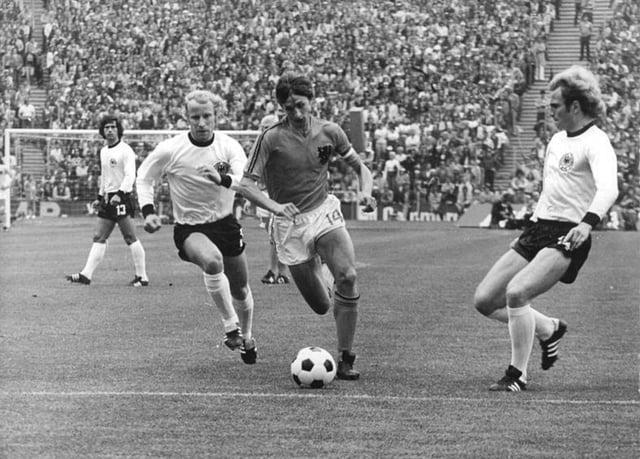
Cruyff in the box during the 1974 World Cup Final, just before he was fouled for a penalty
Cruyff led the Netherlands to a runners-up medal in the 1974 World Cup and was named player of the tournament.[10] Thanks to his team's mastery of Total Football, they coasted all the way to the final, knocking out Argentina (4–0), East Germany (2–0) and Brazil (2–0) along the way.[10] Cruyff scored twice against Argentina in one of his team's most dominating performances, then he scored the second goal against Brazil to knock out the defending champions.[10]
The Netherlands faced hosts West Germany in the final. Cruyff kicked off and the ball was passed around the Oranje team 15 times before returning to Cruyff, who then went on a run past Berti Vogts and ended when he was fouled by Uli Hoeneß inside the box. Teammate Johan Neeskens scored from the spot kick to give the Netherlands a 1–0 lead and the Germans had not yet touched the ball.[10] During the latter half of the final, his influence was stifled by the effective marking of Vogts, while Franz Beckenbauer, Uli Hoeneß and Wolfgang Overath dominated the midfield as West Germany came back to win 2–1.[55]
In an interview published in the 50th anniversary issue of World Soccer magazine, the captain of the Brazilian team that won the 1970 World Cup, Carlos Alberto, went on to say, "The only team I've seen that did things differently was Holland at the 1974 World Cup in Germany. Since then everything looks more or less the same to me.... Their 'carousel' style of play was amazing to watch and marvellous for the game."[56]
With regards to role models, Brazilian football manager and former player Telê Santana has mentioned in one interview that he had no idols, though, "My greatest satisfaction would be to manage a team such as 1974 Holland. It was a team where you could pick [Johan] Cruyff and place him on the right wing. If I had to put him in the left-wing, he would still play [the same]. I could choose Neeskens, who played both to the right and to the left of the midfield. Thus, everyone played in any position."[57]
After 1974
Cruyff retired from international football in October 1977, having helped the national team qualify for the upcoming World Cup.[10] Without him, the Netherlands finished runners-up in the World Cup again. Initially, the reason given for missing the 1978 World Cup were political reasons given a military dictatorship was in power in Argentina at that time. In 2008, Cruyff stated to the journalist Antoni Bassas in Catalunya Ràdio that he and his family were subject to a kidnap attempt in Barcelona a year before the tournament, and that this had caused his retirement. "To play a World Cup you have to be 200% okay, there are moments when there are other values in life."[58]
Coaching career
Entry into management with Ajax
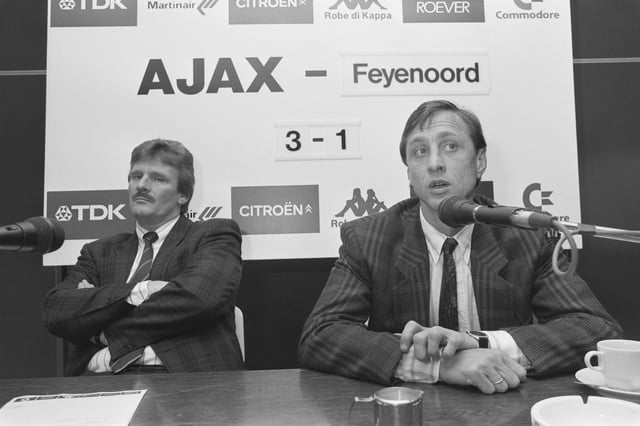
Cruyff as manager of Ajax in 1987
After retiring from playing, Cruyff followed in the footsteps of his mentor Rinus Michels, coaching a young Ajax side to victory in the European Cup Winners' Cup in 1987 (1–0). In May and June 1985, Cruyff returned to Ajax again. In the 1985–86 season, the league title was lost to Jan Reker's PSV, despite Ajax having a goal difference of +85 (120 goals for, 35 goals against). In the 1985–86 and 1986–87 seasons, Ajax won the KNVB Cup.
If you look at the greatest players in history, most of them couldn't coach. If you look at the greatest coaches in history, most of them were not great players. Johan Cruyff did both – and in such an exhilarating style. —Former Dutch international Johan Neeskens[59]
It was during this period as manager that Cruyff was able to implement his favoured team formation—three mobile defenders; plus one more covering space – becoming, in effect, a defensive midfielder (from Rijkaard, Blind, Silooy, Verlaat, Larsson, Spelbos), two "controlling" midfielders (from Rijkaard, Scholten, Winter, Wouters, Mühren, Witschge) with responsibilities to feed the attack-minded players, one second striker (Bosman, Scholten), two touchline-hugging wingers (from Bergkamp, van't Schip, De Wit, Witschge) and one versatile centre forward (from Van Basten, Meijer, Bosman). So successful was this system that Ajax won the Champions League in 1995 playing Cruyff's system – a tribute to Cruyff's legacy as Ajax coach.[21]
Return to Barcelona as manager
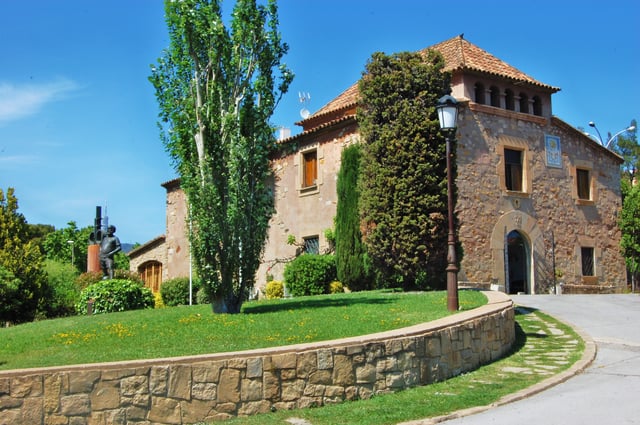
Main façade of old La Masia, the Barcelona youth academy. La Masia academy was Cruyff's brainchild.
After having appeared for the club as a player, Cruyff returned to Barcelona for the 1988–89 season, this time to take up his new role as coach of the first team. Before returning to Barcelona, however, Cruyff had already built up plenty of experience as a coach/manager. In the Netherlands, he was strongly praised for the attacking flair he imposed on his sides and also for his commendable work as talent spotter, discovering, for example Marco van Basten and Dennis Bergkamp. With Barça, Cruyff started work with a completely remodelled side after the previous season's scandal, known as the "Hesperia Mutiny". His second in command was Carles Rexach, who had already been at the club for a year. Cruyff immediately had his Barça charges playing his attractive brand of football and the results did not take long in coming. But, this did not just happen with the first team, the youth teams also displayed that same attacking style, something that made it easier for reserve players to make the switch to first team football.[60] As Sid Lowe noted, when Cruyff took over as manager, Barcelona of the late 1980s "were a club in debt and in crisis. Results were bad, performances were worse, the atmosphere terrible and attendances down, while even the relationship between the president of the club Josep Lluís Núñez and the president of the Spanish autonomous community they represented, Jordi Pujol, had deteriorated. It did not work immediately but he [Cruyff] recovered the identity he had embodied as a player. He took risks, and rewards followed."[61]
At Barça, Cruyff brought in players such as Pep Guardiola, José Mari Bakero, Txiki Begiristain, Andoni Goikoetxea, Ronald Koeman, Michael Laudrup, Romário, Gheorghe Hagi and Hristo Stoichkov. With Cruyff, Barça experienced a glorious era. In the space of five years (1989–1994), he led the club to four European finals (two European Cup Winners' Cup finals and two European Cup/UEFA Champions League finals). Cruyff's track record includes one European Cup, four Liga championships, one Cup Winners' Cup, one Copa del Rey and four Supercopa de España.[62]
Under Cruyff, Barça's "Dream Team" won four La Liga titles in a row (1991–1994), and beat Sampdoria in both the 1989 European Cup Winners' Cup final and the 1992 European Cup final at Wembley Stadium.[63] On 10 May 1989, goals from Salinas and López Rekarte led Barcelona to a 2–0 victory against Sampdoria. Over 25,000 supporters travelled to Switzerland to support the team. Cruyff's new Barça took home the club's third Cup Winners' Cup. The European Cup dream became a reality on 20 May 1992 at Wembley in London, when Barça beat Sampdoria. Cruyff's last instruction to his players before they stepped onto the pitch was "Salid y disfrutad" (Spanish for "Go out and enjoy it" or "Go out there and enjoy yourselves").[64][65] The match went to extra time after a scoreless draw. In the 111th minute, Ronald Koeman's brilliant free kick clinched Barça's first European Cup victory. Twenty-five thousand supporters accompanied the team to Wembley, while one million turned out on the streets of Barcelona to welcome the European champions home.[64] Victories under Cruyff include a 5–0 La Liga win over Real Madrid in El Clásico at the Camp Nou, as well as a 4–0 win against Manchester United in the Champions League.[66][67] Barcelona won a Copa del Rey in 1990, the European Super Cup in 1992 and three Supercopa de España, as well as finishing runner-up to Manchester United and Milan in two European finals.[63]
The legacy that Cruyff gave Barcelona, however, was about more than just trophies and records, as he gave Barça a winning mentality and footballing identity/ideology that runs through the club till this day. As Barcelona manager, he laid systemic foundations for a prominent school of football: "Barçajax school" or "Barça-Ajax school", as it has been termed by many. The predominant style of play, now known as tiki-taka or tiqui-taca, had been transferred and improved from Ajax to Barça. It was that which has sustained Barcelona since the days of Vic Buckingham, Rinus Michels and Cruyff (as player) in the early 1970s: they were the ideas of Ajax; Total Football, a predominant belief in possession-oriented football with an attack-minded 3–4–3/4–3–3 team formation, rooted in a high offside line, pressing and the interchange of players on the field. When Cruyff became Barcelona's manager in 1988, he reinforced this footballing philosophy.[68] He was also responsible for introducing "rondos" (a circle of players pass the ball to each other, while one in the centre tries to catch it) into the team's training sessions. About Cruyff's lasting influence on Barça's youth academy La Masia, Guillem Balagué noted, "Cruyff demanded changes at the academy and La Masía began regularly producing the players he wanted as well as providing the kids with a sound education, dual ambitions of the Dutch coach and the club. "The player who has come through La Masía has something different from the rest, it's a plus that only comes from having competed in a Barcelona shirt from the time you were a child", says Guardiola. He is talking not only about the understanding of the game and their ability, but about human qualities. The players who go through La Masía are taught to behave with civility and humility. The theory being that, not only is it pleasant to be unassuming, but also if you are humble, you are capable of learning – and the capacity to learn is the capacity to improve. If you aren't capable of learning you won't improve. Since his arrival, Johan had tried and succeeded in convincing the club to train all the junior teams in the same way as the first eleven – and to favour talent over physique."[69]
Cruyff used to smoke 20 cigarettes a day prior to undergoing double heart bypass surgery in 1991 while he was the coach of Barcelona, after which he gave up smoking. He also led the anti-smoking campaign developed by the Health Department of the Catalan autonomous government. Cruyff juggled a cigarette pack 16 times in an anti-tobacco video sponsored by the Catalan Department of Health.[70]
With 11 trophies, Cruyff was Barcelona's most successful manager, but has since been surpassed by his former player Pep Guardiola, who achieved 15. Cruyff was also the club's longest-serving manager. In his final two seasons, however, he failed to win any trophies, falling-out with chairman Josep Lluís Núñez, who ultimately sacked him as Barcelona coach.[71]
While still at Barcelona, Cruyff was in negotiations with the KNVB to manage the national team for the 1994 World Cup finals, but talks broke off at the last minute.[72]
Catalonia national team
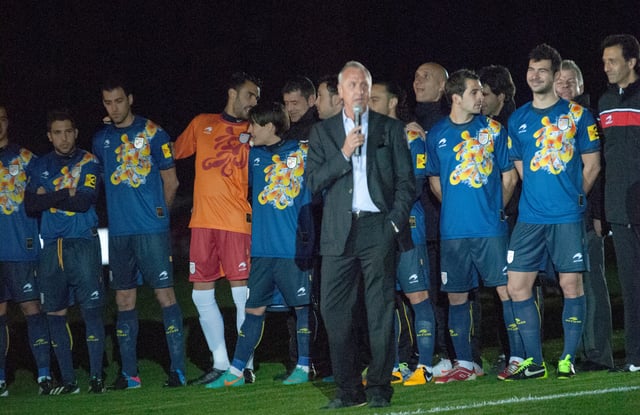
Cruyff with the Catalonia national team in January 2013
As well as representing Catalonia on the pitch in 1976, Cruyff also managed the Catalonia national team from 2009 to 2013, leading the team to a victory over Argentina in his debut match.[73]
On 2 November 2009, Cruyff was named as manager of the Catalonia national team. It was his first managing job for 13 years.[74] On 22 December 2009, they played a friendly game against Argentina, which ended in a Catalonia win, 4–2 at Camp Nou. On 28 December 2010, Catalonia played a friendly against Honduras winning 4–0 at Estadi Olímpic Lluís Companys.[75] On 30 December 2011, Catalonia played Tunisia in a goalless draw at the Lluís Companys.[76] In their last game under Cruyff, on 2 January 2013, Catalonia drew with Nigeria at the Cornellà-El Prat, 1–1.[77]
Other football-related activities
As a technical advisor
Unofficial advisor to Barcelona president Joan Laporta
I chose Frank Rijkaard, Txiki Begiristain and Pep Guardiola because Johan told me to.— Joan Laporta, in an interview (March 2017)[78]
Later in his reign as Barcelona manager, Cruyff suffered a heart attack and was advised to quit coaching by his doctors. He left in 1996, and never took another top job, but his influence did not end there. Though he vowed never to coach again, he remained a vocal football critic and analyst. Cruyff's open support helped candidate Joan Laporta to victory in Barcelona's presidential elections. He continued to be an adviser for him, although he held no official post at Barcelona.[79][80] Back in an advisory capacity alongside Joan Laporta, he recommended the appointment of Frank Rijkaard in 2003. Again Barca was successful, winning back-to-back league titles and another Champions League crown in 2006.
After two relatively disappointing campaigns, Laporta survived a censure motion and an overhaul was needed. In summer 2008, Rijkaard left the club and even though José Mourinho was pushing for the job at Camp Nou, Cruyff chose Pep Guardiola. Many were quick to point to Guardiola's lack of coaching experience, but Cruyff said, "The biggest test for a coach at a team like Barça is the strength to make decisions and the ability to talk to the press, because they don't help and you have to manage that. After that, it's easy for those who know football. But there aren't many who know."[81]
Return to Ajax as technical director
On 20 February 2008, in the wake of a major research on the ten-year-mismanagement, it was announced that Cruyff would be the new technical director at his boyhood club Ajax, his fourth stint with the Amsterdam club.[85] Cruyff announced in March that he was pulling out of his planned return to Ajax because of "professional difference of opinion" between him and Ajax's new manager, Marco van Basten. Van Basten said that Cruyff's plans were "going too fast", because he was "not so dissatisfied with how things are going now".[86]
On 11 February 2011, Cruyff returned to Ajax on an advisory basis after agreeing to become a member of one of three "sounding board groups".[87] After presenting his plans to reform the club, in particular to rejuvenate the youth academy, the Ajax board of advisors and the CEO resigned on 30 March 2011.[88] On 6 June 2011, he was appointed to the new Ajax board of advisors to implent his reform plans.[89][90]
The Ajax advisory board made a verbal agreement with Louis van Gaal to appoint him as the new CEO, without consulting Cruyff.[91][92] Cruyff, a fellow board member, took Ajax to court in an attempt to block the appointment.[93] The court overturned the appointment on the grounds that Cruyff had been "deliberately not consulted".[94] Cruyff was supported by many Ajax supporters and ex-Ajax players and current staff members, including Dennis Bergkamp, Wim Jonk, Marc Overmars, Frank de Boer and Edwin van der Sar.[94] Due to the ongoing quarrel within the advisory board, Cruyff resigned on 10 April 2012, with Ajax stating that Cruyff will "remain involved with the implementation of his football vision within the club".[95]
Technical advisor for Chivas Guadalajara
Cruyff became a technical advisor for Mexican club Guadalajara in February 2012. Jorge Vergara, the owner of the club, made him the team's sport consultant in response to the losing record Guadalajara sustained in the last few months of 2011.[96] Although signed to a three-year contract, Cruyff's contract was terminated December 2012 after just nine months with the club. Guadalajara said that other members of the team's coaching staff would likely not be terminated.[97]
Ambassador for Belgium and the Netherlands joint bid to host the World Cup
In September 2009, Cruyff and Ruud Gullit were unveiled as ambassadors for the Belgium–Netherlands joint bid for the World Cup finals in 2018 or 2022 at the official launch in Eindhoven.[98]
Style of play and views on the game
The total footballer
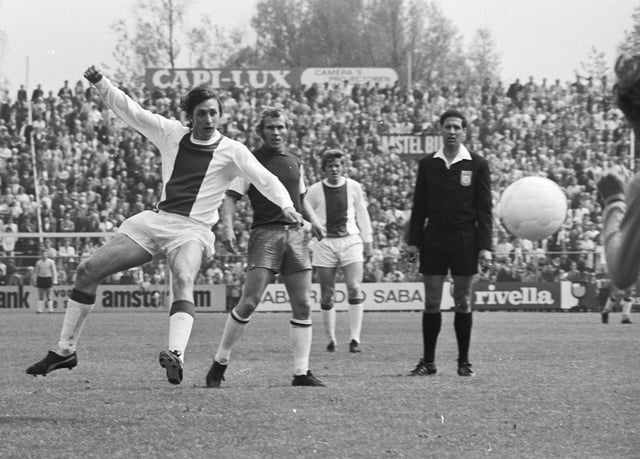
Cruyff playing with Ajax in 1971. In modern football, Cruyff was one of the brilliant pioneers of the "false 9" position.[99]
Throughout his career, Cruyff became synonymous with the playing style of "Total Football".[100][101][102] It is a system where a player who moves out of his position is replaced by another from his team, thus allowing the team to retain their intended organizational structure. In this fluid system, no footballer is fixed in their intended outfield role. The style was honed by Ajax coach Rinus Michels, with Cruyff serving as the on-field "conductor".[103][104] Space and the creation of it were central to the concept of Total Football. Ajax defender Barry Hulshoff, who played with Cruyff, explained how the team that won the European Cup in 1971, 1972 and 1973 worked it to their advantage: "We discussed space the whole time. Cruyff always talked about where people should run, where they should stand, where they should not be moving. It was all about making space and coming into space. It is a kind of architecture on the field. We always talked about speed of ball, space and time. Where is the most space? Where is the player who has the most time? That is where we have to play the ball. Every player had to understand the whole geometry of the whole pitch and the system as a whole."[105]
The team orchestrator, Cruyff was a creative playmaker with a gift for timing passes.[106] Nominally, he played centre-forward in this system and was a prolific goalscorer, but dropped deep to confuse his markers or moved to the wing to great effect.[107] In the 1974 World Cup final between West Germany and the Netherlands, from the kick-off, the Dutch monopolised ball possession. At the start of the move that led to the opening goal, Cruyff picked up the ball in his own half. The Dutch captain, who was nominally a centre-forward, was the deepest Dutch outfield player, and after a series of passes, he set off on a run from the centre circle into the West German box. Unable to stop Cruyff by fair means, Uli Hoeness brought Cruyff down, conceding a penalty scored by Johan Neeskens. The first German to thus touch the ball was goalkeeper Sepp Maier picking the ball out of his own net.[108] Due to the way Cruyff played the game, he is still referred to as "the total footballer".[109] Former French player Eric Cantona states, "I loved the Dutch in the '70s, they excited me and Cruyff was the best. He was at the heart of a revolution with his football. Ajax changed football and he was the leader of it all. If he wanted he could be the best player in any position on the pitch."[110]
Cruyff was known for his technical ability, speed, acceleration, dribbling and vision, possessing an awareness of his teammates' positions as an attack unfolded. Despite his relatively unimpressive stature and strength, Cruyff's tactical brain and reading of the game were exceptional. "Football consists of different elements: technique, tactics and stamina", he told the journalists Henk van Dorp and Frits Barend, in one of the interviews collected in their book Ajax, Barcelona, Cruyff. "There are some people who might have better technique than me, and some may be fitter than me, but the main thing is tactics. With most players, tactics are missing. You can divide tactics into insight, trust and daring. In the tactical area, I think I just have more than most other players." On the concept of technique in football, Cruyff once said: "Technique is not being able to juggle a ball 1,000 times. Anyone can do that by practising. Then you can work in the circus. Technique is passing the ball with one touch, with the right speed, at the right foot of your team mate."[111] As Van Basten noted, "Johan is so technically perfect that even as a boy he stopped being interested in that aspect of the game. He could do everything when he was 20. That's why he's been very interested in tactics since he was very young. He sees football situations so clearly that he was always the one to decide how the game should be played."[112] In 1997, Dutch journalist Hubert Smeets wrote, "Cruyff was the first player who understood that he was an artist, and the first who was able and willing to collectivise the art of sports."[102][113] Sports writer David Miller believed that Cruyff was superior to any previous player in his ability to extract the most from others. He dubbed him "Pythagoras in boots" for the complexity and precision of his passes and wrote, "Few have been able to exact, both physically and mentally, such mesmeric control on a match from one penalty area to another."[114]
According to England's 1966 World Cup-winning striker Bobby Charlton, "He [Cruyff] was pretty intelligent, too! A real football brain. He had superb control, he was inventive and he could perform magic with a ball to get himself out of trouble instinctively. He got a lot of goals, and although he was so skilful, he didn't show off – he played to the strengths of the players around him. This side would really keep hold of the ball."[115]
Importance of style and identity as cultural values in football
Winning is an important thing, but to have your own style, to have people copy you, to admire you, that is the greatest gift.— Johan Cruyff[116]
Cruyff always considered aesthetic and moral aspects of the game; it is not just about winning, but about winning with "right" style/way. He also always spoke highly of entertaining value of the game. The beautiful game, for him, is about as much the entertainment and joy as the results. In thinking of Cruyff, the victory is truly meaningful when it can fully capture the minds and hearts of competitors and spectators. As he once noted, "Quality without results is pointless. Results without quality is boring,".[117] For Cruyff and the Cruyffistas (Cruyff's devout followers), to choose a "right" style of play to win is even more important than winning itself.[118][119] Cruyff always believed in simplicity. He sees simplicity and beauty as inseparable. "Simple football is the most beautiful. But playing simple football is the hardest thing", as Cruyff once summed up his fundamental philosophy.[120] "How often do you see a pass of forty meters when twenty meters is enough?... To play well, you need good players, but a good player almost always has the problem of a lack of efficiency. He always wants to do things prettier than strictly necessary."[121] Cruyff also perfected a feint now known as the "Cruyff Turn".[107] The feint is an example of the simplicity in Cruyff's football philosophy. It was neither carried out to embarrass the opponent nor to excite the watching crowd, but because Cruyff estimated that it was the simplest method (in terms of effort and risk versus expected result) to beat his opponent. Cruyff looked to pass or cross the ball, then, instead of kicking it, he dragged the ball behind his planted foot with the inside of his other foot, turned through 180 degrees, and accelerated away.[122] As Swedish defender Jan Olsson (a "victim" of the Cruyff Turn at the 1974 World Cup) recalled, "I played 18 years in top football and seventeen times for Sweden but that moment against Cruyff was the proudest moment of my career. I thought I'd win the ball for sure, but he tricked me. I was not humiliated. I had no chance. Cruyff was a genius."[123] With its high effectiveness and unpredictability, the Cruyff Turn remains one of the most commonly used dribbling moves in modern football.[124][125]
Like Dutch football in general until the mid-1960s, Cruyff's early playing career was considerably influenced by coaching philosophy of British/English coaches such as Vic Buckingham.[126][127] However, his footballing philosophy shares more similar aspects to free-flowing style of South American football (Brazilian football in particular)[128][129] than traditional British/Anglo-Saxon school of football (with distinctively direct, aggressive, heavily athletic, muscular, physical elements in coaching and playing style).[130][131][132] However, as Tim Vickery has pointed out, at the 1974 World Cup Cruyff's Netherlands side "rendered South American football obsolete", with the Dutch comfortably defeating Uruguay, Argentina and Brazil on their way to the final: their willingness to press their opponents denied the South American nations' playmakers the time on the ball they were used to having. The effect of this encounter with Total Football on Argentinian and Brazilian football was significant: in Argentina, César Luis Menotti, who became coach of the national team after the 1974 World Cup exit, sought to combine the traditional Argentine passing game with a faster tempo of play, emphasising relatively small but hard-working players like Osvaldo Ardiles in leading the national team to victory on home soil in the 1978 World Cup. Whilst Brazil attempted to implement a Total Football philosophy without success in 1978 under coach Cláudio Coutinho before reverting to their traditional style in 1982, Brazilian coaches eventually came to believe that they needed to catch up to the Europeans in terms of their physical development, with the gap in physical size being closed by the turn of the millennium: the nature of Brazil's passing game also changed, coming to emphasise quick counter-attacks down the flanks rather than long passing sequences.[133]
The mind-body duality always plays an important role in his footballing philosophy. In Cruyff's words, quoted in Dennis Bergkamp's autobiography Stillness and Speed: My Story, "...Because you play football with your head, and your legs are there to help you. If you don't use your head, using your feet won't be sufficient. Why does a player have to chase the ball? Because he started running too late. You have to pay attention, use your brain and find the right position. If you get to the ball late, it means you chose the wrong position. Bergkamp was never late."[134] For Cruyff, football (the so-called beautiful game) is much an artistic-oriented mind-body game instead of an athletic-oriented physical competition. As he put it, "Every trainer talks about movement, about running a lot. I say don't run so much. Football is a game you play with your brain. You have to be in the right place at the right moment, not too early, not too late."[105] The creativity is always the key element in his footballing philosophy, both as a player and as a manager. Cruyff once compared his more intuitive and individualistic approach with Louis van Gaal's more mechanized and rigid coaching style, "Van Gaal has a good vision on football. But it's not mine. He wants to gel winning teams and has a militaristic way of working with his tactics. I don't. I want individuals to think for themselves and take the decision on the pitch that is best for the situation... I don't have anything against computers, but you judge football players intuitively and with your heart. On the basis of the criteria which are now in use at Ajax [recommended by Van Gaal] I would have failed the test. When I was 15, I could barely kick the ball 15 metres with my left and with the right maybe 20 metres. I would not have been able to take a corner. Besides, I was physically weak and relatively slow. My two qualities were great technique and insight, which happen to be two things you can't measure with a computer."[135]
Cruyff's favourite world XI
In his posthumously released autobiography My Turn: The Autobiography,[136] Cruyff reveals his dream all-time XI in his favourite 3-4-3/4–3–3 formation. Cruyff's side (in the 3–4–3 diamond formation) reads as follows: Lev Yashin (goalkeeper); Ruud Krol (full back/wing-back), Franz Beckenbauer (central defender/libero), Carlos Alberto (full-back/wing-back); Pep Guardiola (holding midfielder/midfield anchor), Bobby Charlton, Alfredo Di Stéfano, Diego Maradona (playmaker/attacking midfielder/second striker); Piet Keizer (winger), Garrincha (winger), and Pelé (centre-forward/striker). For humility, Cruyff didn't put himself in there, but there is a spot for his pupil, Pep Guardiola and his former teammates, Ruud Krol and Piet Keizer. It's a typically attacking line-up but Cruyff explains the selection in detail. "For the ideal squad, I also try and find a formula in which talent is used to the maximum in every case", notes Cruyff. "The qualities of one player have to complement the qualities of another."[137][138]
The 14 rules of Johan Cruyff
In his autobiography, Cruyff explained why he made a set of 14 basic rules, which are displayed at every Cruyff Court in the world, "I read an article once about the building of the pyramids in Egypt. It turns out that some of the numbers coincide completely with natural laws – the position of the moon at certain times and so on. And it makes you think: how is it possible that those ancient people built something so scientifically complex? They must have had something that we don't, even though we always think that we're a lot more advanced than they were. Take Rembrandt and van Gogh: who can match them today? When I think that way, I'm increasingly convinced that everything is actually possible. If they managed to do the impossible nearly five thousand years ago, why can't we do it today? That applies equally to football, but also to something like the Cruyff Courts and school sports grounds. My fourteen rules are set out for every court and every school sports ground to follow. They are there to teach young people that sports and games can also be translated into everyday life."[136]
And he listed his 14 basic rules that include:
Team player – 'To accomplish things, you have to do them together.';
Responsibility – 'Take care of things as if they were your own.';
Respect – 'Respect one another.';
Integration – 'Involve others in your activities.';
Initiative – 'Dare to try something new.';
Coaching – 'Always help each other within a team.';
Personality – 'Be yourself.';
Social involvement – 'Interaction is crucial, both in sport and in life.';
Technique – 'Know the basics.';
Tactics – 'Know what to do.';
Development – 'Sport strengthens body and soul.';
Learning – 'Try to learn something new every day.';
Play together – 'An essential part of any game.';
Creativity – 'Bring beauty to the sport.'[136]
Influence and legacy
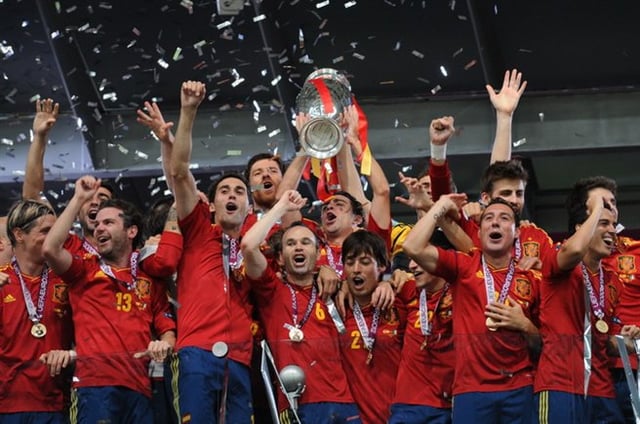
Spain's players celebrating their Euro 2012 victory. It didn't come as a coincidence as Barcelona and Spain ruled the world of football in the same period. Cruyff's football philosophy helped lay the systemic foundations for Spanish period of dominance (2008–2012) in world football at both club and international level.[139]
Cruyff is widely seen as an iconic and revolutionary figure in history of Ajax, Barça,[140][141][142] and the Oranje. David Winner, the author of Brilliant Orange, wrote about Cruyff's influential career in the football world, "There have been lots of brilliant football figures down the years, but none has been as significant as Johan Cruyff. As a player with Ajax, Barcelona and the Netherlands, he put himself in the pantheon along with greats such as Pelé, Diego Maradona, Ferenc Puskás, Lionel Messi and Zinedine Zidane. As coach at Ajax and Barcelona, he built thrilling sides, nurtured a remarkable number of genius players and influenced many of the most important teams in the world. The all-conquering Spain and Barcelona of Xavi and Andrés Iniesta, brilliant Bayern Munich and Germany of today, AC Milan of the late 1980s and many other memorable champions would have been unthinkable without Cruyff. Once radical and revolutionary, Cruyffian principles have become standard throughout the modern game. His blueprint for developing young players has been copied all over the world."[143] Gabriele Marcotti summed up Cruyff's footballing greatness: "There may have been better players in the history of the game, though I doubt you can count them on more than one hand. And there may have been better managers, too, if only because his coaching career only lasted 10 and a half years (during which he won 14 trophies, not a bad return). But it's tough to argue that any man has exerted a greater influence – on the pitch and on the bench – on the game as we know it today."[18]
As a player, he turned football into an art form. Johan came along and revolutionised everything. The modern-day Barça started with him, he is the expression of our identity, he brought us a style of football we love. —Barcelona's ex-president Joan Laporta, 2010[144]
Barcelona was not born in the last couple of years. It was born, the style of play now, in the early 90s through Johan Cruyff. —Head coach of the United States national team Jürgen Klinsmann, 2011.[145]
Referring to the influence of his style of play at Ajax, Barcelona ("Dream Team"), and with the Netherlands ("Total Football"), in addition to the 200 Cruyff courts he set up around the world for kids to hone their skills, football journalist Graham Hunter states, "Johan Cruyff is, pound for pound, the most important man in the history of football."[146] In his 2011 book, Barça: The Making of the Greatest Team in the World, Hunter writes,
If the 175,000 FC Barcelona members queued up in an orderly line, night after night, to massage his tired feet, cook his dinner and tuck him into bed; if they carried his golf clubs round Montanyá's hilly 18 holes; if they devoted 50 percent of their annual salary to him ... it still wouldn't be near enough to repay the debt those who love this club owe Johan Cruyff. If he had not installed a culture, a philosophy at the Nou Camp, then Lionel Messi would have been rejected and sent home as an underdeveloped 13-year-old kid. Andrés Iniesta wouldn't have been selected.[146]
Dietrich Schulze-Marmeling, author of the German biography of Cruyff ("Der König und sein Spiel: Johan Cruyff und der Weltfußball" or "The King and His Game: Johan Cruyff and the World Football" in English), concluded that the Dutchman was the most influential figure in football history, stating no one made a bigger impact both as a player and as a manager.[147]
Cruyff is sometimes described as a typical kind of 'artist-footballer'[148][149][150] or 'footballer-thinker' who considers football, the so-called 'beautiful game', not a purely athletic/physical competition but an artistic-oriented mind-body game. Because of his distinctive footballing views, Cruyff was called 'the Spinoza of football' by some.[151][152][153] He believed in a certain style of play, which has the power to put a smile on the people's faces as he described it.[154] When Cruyff, both as a player and as a manager, spoke about football he often mentioned the entertainment value of the game, that there is more to it than winning.[155][156] In a 2009 interview with *Sportmail'*s Martin Samuel, Arsène Wenger, as a devout follower of Cruyff's footballing ideology,[157] once shared his opinion about football's artistic value,
I believe the target of anything in life should be to do it so well that it becomes an art. When you read some books they are fantastic, the writer touches something in you that you know you would not have brought out of yourself. He makes you discover something interesting in your life. If you are living like an animal, what is the point of living? What makes daily life interesting is that we try to transform it to something that is close to art. And football is like that. When I watch Barcelona, it is art.[158]
Chérif Ghemmour, the author of Cruyff's French biography,[159] called him 'the greatest actor in the history of football'[160] because Cruyff was an exception (possibly the only one) being the man who 'played' outstandingly well multiple roles in the world of football: player, manager, and thinker.[161][162] For many people, more than just a great footballer or sportsman, Cruyff is also a remarkable cultural figure.[163][164][165] Outside football, there were many articles about the applicability of Cruyff's principles and views in the football world into other fields, such as business management and education.[166][167][168]
As a player
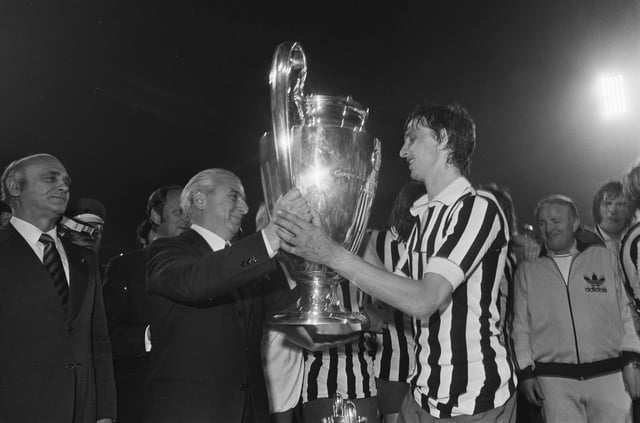
Johan Cruyff after the 1973 European Cup Final. Ajax's victory meant that the club had earned the privilege of becoming the second European side, after Real Madrid, to keep the original European Cup/UEFA Champions League trophy permanently. Ajax is one of only five clubs (besides Real Madrid, Bayern Munich, A.C. Milan, and Liverpool) to achieve this feat.[179]
We showed the world you could enjoy being a footballer; you could laugh and have a fantastic time. I represent the era which proved that attractive football was enjoyable and successful, and good fun to play too. —Johan Cruyff[169]
Regarded by many as Europe's first true football superstar,[170] Cruyff is often mentioned alongside the pair widely considered the finest to have played the game, Pele and Maradona.[171][172] As a player, he greatly helped turn the previously backward and obscure Dutch football (at both club and international level) into a world-class powerhouse in the 1970s.[173][174] In Simon Kuper's words, "without Cruyff, Holland [Netherlands] wouldn't have had a footballing tradition."[175] Cruyff is always considered to be an indisputable icon in Ajax's history, especially in the club's golden era (1966–1973). He was instrumental in Ajax's transformation from a semi-professional club into a dominant force in European club football.[176][177][178] Cruyff inspired Ajax to win the European Cup three times in succession at the beginning of the 1970s before moving to Barcelona in 1973 and helping the club win their first La Liga title in 14 years. In 1974, he led the Netherlands to their first FIFA World Cup final and received the Golden Ball as player of the tournament.
Cruyff was the most famous exponent of the school of football known as Total Football (Totaalvoetbal in Dutch) explored by Rinus Michels. Being known as "the total footballer", he was also one of the brilliant pioneers of the "false nine" position/role in modern football.[180][181][182][99] In Total Football's heyday (in the early 1970s), Cruyff was truly an 'on-field tactician', an 'on-field manager',[43] or a 'coach-player' at the same time, before the concept of player-coach was at the height of its popularity in professional football during the 1980s and 1990s. As Argentinian World Cup winner Jorge Valdano said of Cruyff, in an interview with Thomas Goubin of SoFoot.com,
Never in my life have I seen a player like Cruyff rule matches. He was the owner of the show. Much more than his team, the referee or the fans. His grip on what was happening on the field was amazing. He was a player, coach and referee at the same time.[183]
Chris McMullan (of FootballFanCast.com) writes that "he [Cruyff] was an anomaly. A man who played football like no one else. He didn't physically play football after all, he played it with his mind. An esoteric pursuit that completely changed the game. A visionary, a departure, a flight of fancy – Cruyff is the ultimate because his contribution to the game wasn't simply personal. He didn't break records, he didn't win golden boots, and only occasionally dazzled with skills. The reason he is a great is because he understood the game like no one else ever did and probably ever will. ... His vision, his ability to see the game in a way that no one else could have was his gift. It showcases his talent, the way he formulated the game in his head and then was able to execute it perfectly with his legs." And he concludes, "There is no one goal, no one clip of football that can encapsulate Johan Cruyff's contribution to football. No one piece of video could ever do that. That's not surprising. Cruyff wasn't a Pele or a Maradona whose careers can be summed up with a series of vines and clips, mountains of goals and skills after another. With Cruyff, you have to think in order to be able to understand it. It doesn't simply happen before your eyes, but it's something altogether more thoughtful, and ultimately more rewarding."[184]
One of very few players who actually have a dribbling move named after them, Cruyff also perfected and popularized a feint now known as the Cruyff Turn (or Cruijff Turn). With its simplicity, effectiveness and unpredictability, the Cruyff Turn remains one of the most commonly used dribbling moves in modern football.[185][186] He was the first player to win the Ballon d'Or three times, in 1971, 1973 and 1974. His world record move from Ajax to Barcelona in 1973 made him the first player to cost more than two million US dollars.
In 1999, Cruyff was voted European Player of the Century in an election held by the International Federation of Football History & Statistics (IFFHS), and came second behind Pelé in their World Player of the Century poll. He came third in a vote organised by the French magazine France Football consulting their former Ballon d'Or winners to elect their Football Player of the Century. He was elected the third-best footballer of the 20th century in a poll by the World Soccer magazine. Cruyff was also chosen on the World Team of the 20th Century in 1998, the FIFA World Cup Dream Team in 2002, and in 2004 was named in the FIFA 100 list of the world's greatest living players.
In an interview in 2011, when Argentina's 1978 World Cup-winning coach César Luis Menotti was discussing Lionel Messi's place in the pantheon of footballing greatness, he mentioned Cruyff in the same breath as Pelé and Maradona: "There have been four kings of football – Di Stéfano, Pelé, Cruyff and Maradona – and the fifth has not yet appeared. We are awaiting the fifth, and it is sure to be Messi, but so far he is not among the kings. You can't give him the crown after five years."[187][188][189] Several notable figures in the world of football such as Arsène Wenger, Michel Platini,[190] Eric Cantona,[191] Marco van Basten,[192] Michael Laudrup,[193] Emilio Butragueño,[194] Rafael Benítez,[195] and Joan Laporta[196] once revealed that they considered Cruyff as their "childhood hero", "idol", or "inspiration".[197] Arrigo Sacchi,[116] Arsène Wenger, Carlos Alberto Torres,[198] Telê Santana, and Marcelo Bielsa were among the great admirers of Cruyff-inspired Dutch school of Total Football. Over the past years, several footballing starlets were dubbed the 'new Johan Cruyff', including Kaká,[199][200] Luka Modrić,[201][202] Shinji Kagawa,[203] and Adnan Januzaj.[204][205]
As a manager

The 3–4–3 (besides the 4–3–3)[206][207][208] was always the favourite team formation of Cruyff in his coaching career. Barça's famous 4–3–3/3–4–3 system (with 3 real forwards) is among Cruyff's lasting legacy.
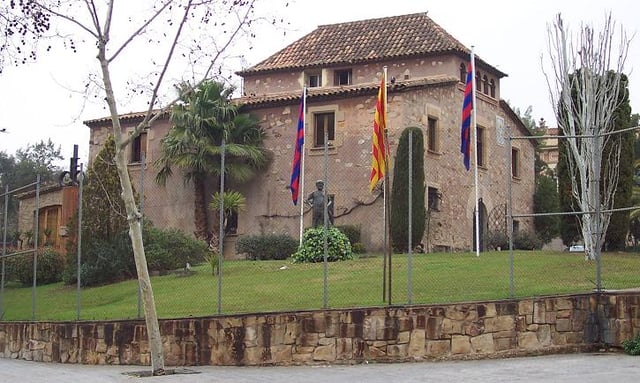
The original La Masia building was the symbolic home of Barça's youth academy. La Masia's coaching system is often considered as the foremost bastion of Cruyff's footballing ideology and Cruyffian (Barçajax) school.
You can separate Barça's history into BCE (Before Cruyff Era) and CE (Cruyff Era). And, yes, Barça are still, nearly 20 years after he coached his final game for the club, still very much in the Cruyff Era.— Gabriele Marcotti, ESPN FC, 2016[209]
Cruyff was regarded by many as one of the few truly great players who made the transition to being a great manager as well.[43][210][211][212] His greatness was summed up by the former Dutch international Johan Neeskens, "If you look at the greatest players in history, most of them couldn't coach. If you look at the greatest coaches in history, most of them were not great players. Johan Cruyff did both – and in such an exhilarating style."[213] Cruyff is undisputedly regarded as one of the greatest and most influential managers in history of the game, despite his top-level coaching career only lasted 11 years with two clubs. In July 2011, website Football Pantheon included him on its list of the top 50 greatest managers of all time.[214] However, Cruyff's coaching legacy was about not just trophies and records but also the style and identity.[215]
As the manager of AFC Ajax, Cruyff was able to implement his favoured team formation (3–4–3): with three mobile defenders; plus one more covering space – becoming, in effect, a defensive midfielder, two "controlling" midfielders with responsibilities to feed the attack-minded players, one second striker, two touchline-hugging wingers and one versatile centre forward. So successful was this system that Ajax won the Champions League in 1995 playing Cruyff's system. The starting point of his system was always the Total Football doctrine of dominating the game with ball possession. When Manchester United lost against Barcelona in the European Cup in 1994 with 4-0, Sir Alex Ferguson remarked about the system Cruyff was using:
That was a big lesson for me. They showed us how important it is to possess the ball. I hadn't understood it until then. I learned how important it is to have control of the ball in European matches.— Sir Alex Ferguson[216]
As Barcelona's manager for nearly a decade, he helped create one of the greatest dynasties in the history of the club and continental football, both in terms of trophies and playing style.[217][61] When Cruyff took over as manager in 1988, Barcelona were in a situation of severe crisis and debt.[61][116] In the space of just six years (1988–1994), Cruyff the manager, with his leadership and management skills,[218] turned Barça from the domestic strugglers and perennial underachievers into a true powerhouse of La Liga and European club football in general.[61][116][219] In the early 1990s, the rise of Cruyff's Barça also officially marked the end of Real Madrid's era of overwhelming dominance (1960s–1980s) in La Liga history. Jonathan Wilson wrote that "He [Cruyff] was a beautiful, brilliant and inspirational player and that alone would have placed him firmly in the pantheon, but what he did as a coach is unparalleled. When he took over Barcelona in 1988, they had won two league titles in 28 years. Crisis had followed crisis. In the 27 years since, they have won 13 league titles and five Champions Leagues... All with the football of Cruyff."[116] At Barcelona, he assembled the so-called Dream Team with brilliant graduates from La Masia as well as world-class foreign players. He used a mix of Spanish players like Pep Guardiola, José Mari Bakero and Txiki Begiristain while signing international players such as Ronald Koeman, Michael Laudrup, Romário and Hristo Stoichkov. Under Cruyff's guidance, Barcelona won four consecutive La Liga titles from 1991 to 1994 and the club's first European Cup in particular. They beat Sampdoria in both the 1989 UEFA Cup Winners' Cup final and the 1992 European Cup final at Wembley, with a free kick goal from Dutch international Ronald Koeman. They also won a Copa del Rey in 1990, the European Super Cup in 1992 and three Supercopa de España trophies. With 11 trophies, Cruyff became the club's most successful manager at that point. He also became the club's longest consecutive serving manager, serving eight years.
Cruyff is officially considered as the founding father of now famous Barça-Ajax school of football (also known as 'Barçajax school'), with a distinctive footballing philosophy and predominant style of play, that was born in Barcelona but has roots in the 1970s Dutch (Amsterdam) school of Total Football.[220][221] La Masia, Barça's youth academy and talent factory, was among Cruyff's lasting legacy. It was the brainchild of Cruyff. In 1979, he wanted to establish a copy of the Ajax Youth Academy in Barcelona. His proposal was accepted by president Josep Núñez. It was ten years after the inception of the youth program, La Masia, when the young players began to graduate and play for their first team. One of the first graduates, who would later earn international acclaim, was previous Barcelona coach Pep Guardiola. On 11 July 2010, Spain won the World Cup final with eight players from Barcelona; seven were from La Masia, and six of them were in the starting line-up: Gerard Piqué, Carles Puyol, Andrés Iniesta, Xavi, Sergio Busquets, and Pedro. This set a record for the most players to be provided by a club side for a team in a World Cup final. On 10 January 2011, La Masia achieved a record breaking honour becoming the first youth academy to have trained all three finalists for the Ballon d'Or in a single year, with Andrés Iniesta, Lionel Messi and Xavi. On 25 November 2012, for the first time in the club's history, away at Levante's Estadi Ciutat de València, Barcelona played with eleven players formed at La Masia. In an English biography of Pep Guardiola, Guillem Balagué writes, "Cruyff introduced some passing drills into Barça's 'arterial' system. And since then, the rondos have been not just a method but a symbol of the club's playing style: of dominating and never losing the ball. Cruyff blended several ideas and concepts and converted them into a philosophy – the seeds of which were planted throughout a club in urgent need of a footballing identity. Until then, the first team of Barcelona had been comfortably living in a world of excuses and enemies, content with their role as victims when faced with Real Madrid, an institution seen from Catalonia as the club of the Establishment", and adding, "Xavi Hernández describes the style in its purest form: 'I pass the ball and move, or I pass the ball and stay where I am. I make myself available to help you; I look at you. I stop, I keep my head up and look, and, above all, I open up the pitch. Whoever has the ball is running play. That comes from the school of Johan Cruyff and Pep Guardiola. This is Barça.'"[69] On the legacy of Cruyff's football philosophy and the passing style of play he introduced to the club, former Barcelona manager Guardiola stated, "Cruyff built the cathedral, our job is to maintain and renovate it."[222] One of the most famous La Masia graduates, Xavi, said, "He [Cruyff] changed the idiosyncrasy of the club. He introduced the philosophy to keep the ball, to play in triangles, to attack. That philosophy remains true to this day. We're all students of Cruyff and his school of thought."[223]
As an ideologue
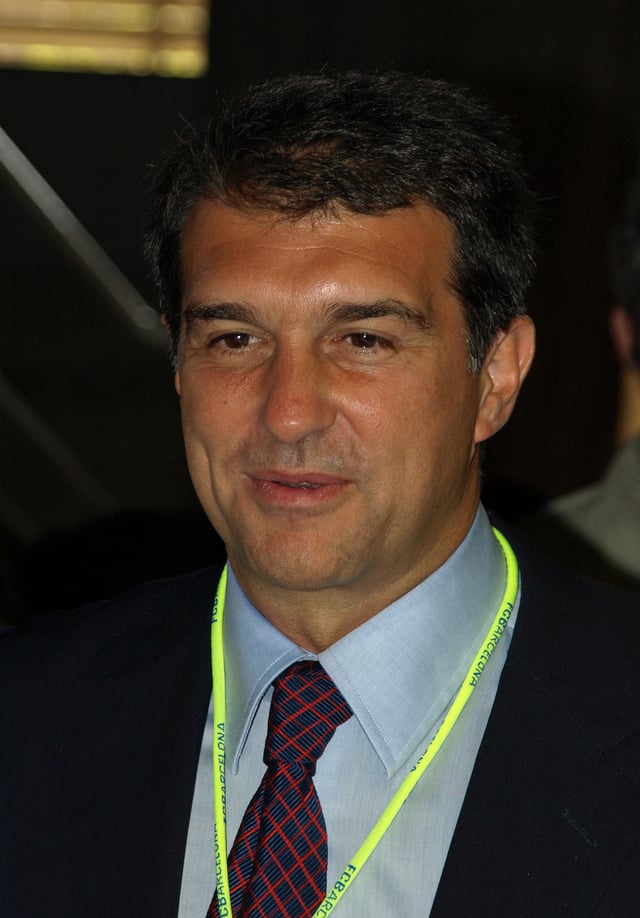
In many respects, former Barça president Joan Laporta is a fervent Cruyffista.[224]
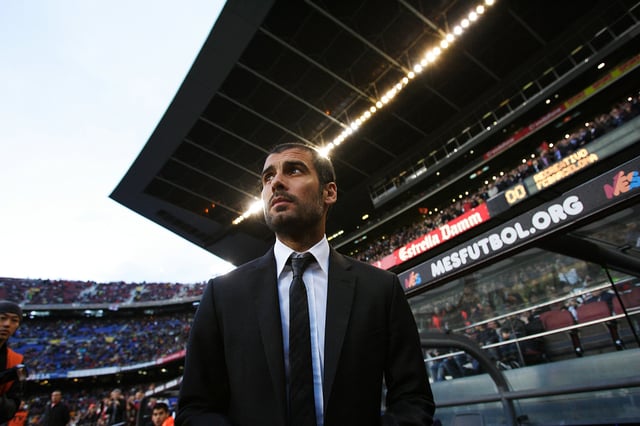
As Cruyffian school's devout follower (Cruyffista), Pep Guardiola's reign at Barcelona (2008–2012) marked one of the most successful eras in the history of the club and its youth academy.[225][226][227]
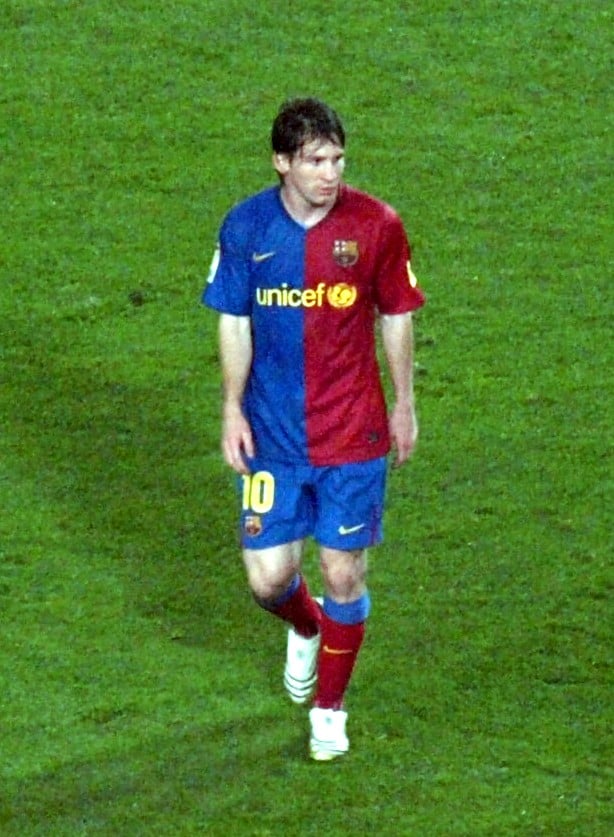
As Guardiola mentioned, Messi – with all his qualities – is considered as the best student and alumnus of Cruyffian school (of football).[246]
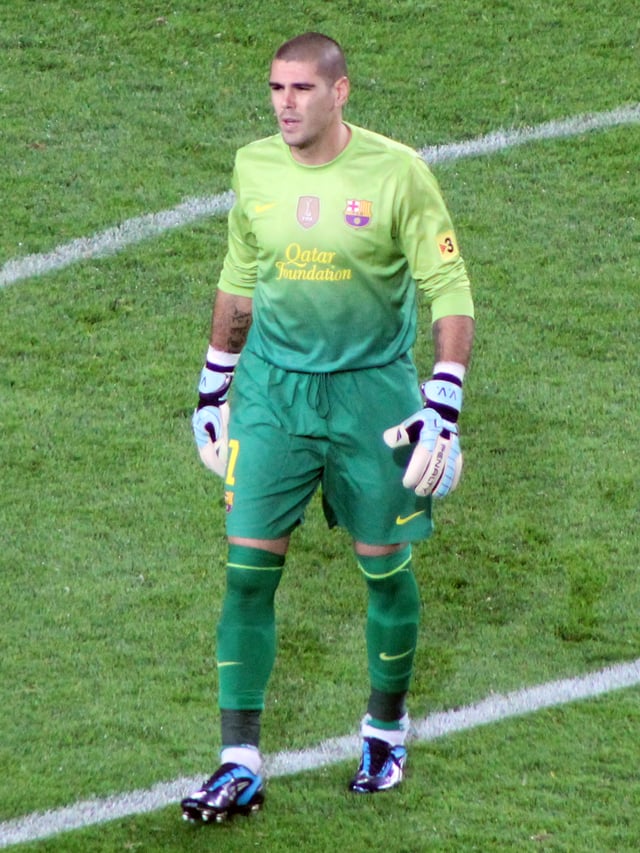
At Barcelona, Víctor Valdés was a typical ball-playing goalkeeper or sweeper-keeper of Cruyff's Barçajax (Barça-Ajax) school of football.[254]
Cruyff established a very clear philosophy at Barcelona, he gave birth to that philosophy, he created Barça's DNA.— Xavi, May 2016[228]
More than merely a great player or manager, Cruyff is also regarded as a great thinker who officially founded and represented a distinctive school of thought in football and a style/way of playing that is predominant today.[43][161][162] Generally seen as a highly influential ideological figure in the football world,[229][230][231] Cruyff was also a brilliant tactical innovator in history of the game. Writing in his weekly blog for *Kicca.com [402] *, Spanish international midfielder Juan Mata, a graduate of Real Madrid's youth academy, hails Cruyff's overall footballing vision, "I consider him [Cruyff] the ideological father of the football; the one I try to play like and the one I look to learn from as a spectator whenever I watch a game. The intelligent use of the ball and the spaces, the importance of talent over the physical condition and the understanding of football as a team sport are concepts that I definitely endorse."[232] His influence at Ajax and Barcelona went beyond his playing and managerial spells as he helped shape the footballing philosophy/identity of both clubs.[233][21][234] La Masia, Barça's youth academy, was the brainchild of Cruyff. As a prominent graduate from the famed Ajax Youth Academy, he always believed using regularly young home-grown players in first-team squad. He established a unique model at La Masia where the youth players could grow up and have a better chance to be part of the senior team, as they would already be accustomed to the style of play. As former La Masia technical director Pep Segura said of Cruyff: "It is about creating one philosophy, one mentality, from the bottom of the club to the top. Cruyff is the one who started it all. He has been the club's most influential figure. We all have the ability to do certain things, but I would not have been able to build something from scratch like Cruyff did. I learned a lot of things from him. I cannot imagine the current Barcelona without Cruyff's work."[235] The style of play Cruyff introduced at Barcelona came to be known as tiki-taka[236] — characterised by short passing and movement, working the ball through various channels, and maintaining possession — which was adopted by UEFA Euro 2008-, 2010 World Cup- and Euro 2012-winning Spain national team.[237] After decades of being known as the perennial underachievers on the international stage, Spain created one of the most dominant dynasties in international football history between 2008 and 2012.[238][239][240] By winning Euro 2012, Spain became the first national team to win three straight world and continental championships and the first to win consecutive Euro titles.[241][242] According to Xavi, the Barcelona and Spain midfielder at the heart of tiki-taka style of play, "Our model was imposed by [Johan] Cruyff; it's an Ajax model. It's all about rondos [piggy in the middle]. Rondo, rondo, rondo."[243][244][245]
Cruyff's footballing principles have significantly influenced the football career of many players and managers,[247] including Frank Rijkaard and Pep Guardiola,[248][249] two devoted disciples and successors of the Cruyffian (Barça-Ajax) school of football. Without Cruyff operating behind the scenes as the spiritual father of Barça,[250] there could be no Joan Laporta presidency, and Rijkaard and Guardiola, two largely unproven managers, could never have been appointed.[251] Guardiola, a typical product (graduate) of Cruyffian school,[249] who was the manager of Barcelona between 2008 and 2012, stated: "Throughout my career I've simply tried to instil what I learned from Johan Cruyff. He has had the biggest influence on football out of anyone in the world, first as a player and then as a coach. He taught me a lot and you can see that in the fact that so many of his former players are now coaches".[252] Guardiola added, "Johan Cruyff built the cathedral, our job is to maintain and renovate it."[253] In regards to how the football world will remember Cruyff's posthumous legacy, he said, "As a player and as a manager he won a lot of titles, but that's not his legacy. The titles only help. Johan has changed two clubs. Not only did he change Ajax, but also Barcelona – and then the Dutch and Spanish national teams, too. Forget the titles. I've won more titles than him. Messi, for example, is someone runs less and in that he's the best of Cruyff's alumni. ... I would not have been capable of doing what he did at Barcelona. He changed everything. He did it all. What Cruyff's done for football cannot be compared. The statue thing is superficial. He has made us love this sport so openly that there's no way we can forget him."[246]
Jürgen Klinsmann, former head coach of the United States national team, said about Cruyff's overall impact on contemporary football, "More than an athlete, Cruyff was also a great thinker, someone who reinvented the sport... Cruyff has left us now, but his vision and philosophy will hopefully live forever. You can see it in the way Barcelona—one of two clubs Cruyff revolutionized, along with Ajax—still plays every week. It's a style that has admirers around the world. I think a lot of people share that [philosophy] with him. You want to see this type of game, where you set the tone, you control the game, you make it fast, you make it attractive and attacking. He's always been famous for his version of the 4–3–3 with the wide wingers, all technically highly gifted and fast. This is his mark."[255]
The Germany national team that won the 2014 World Cup had deep Cruyffian (via Pep Guardiola) influences. After leaving Barcelona, Guardiola implanted the Cruyffian vision at Bayern Munich. Germany and Bayern goalkeeper Manuel Neuer, who completed more passes at the 2014 World Cup than Argentina's Lionel Messi did, incarnates the goalkeeper whom Cruyff dreamt up in the 1960s and 1970s: A footballer in gloves.[256][257] It had always bothered Cruyff that goalkeepers just stopped shots. He thought it was a waste of a player. As Cruyff once said, "In my teams, the goalie (goalkeeper) is the first attacker and the striker the first defender."[258] He wanted a goalkeeper who could also get involved in the passing. Thus, the goalkeeper effectively becomes the 11th player, like Edwin van der Sar at Ajax or Víctor Valdés at Barcelona.[259]
Cruyff's footballing ideas also influenced considerably Belgian football's coaching revolution leading by the former national technical director Michel Sablon in the early 2000s,[260][261] with the introduction of the Barçajax-inspired youth system that developed the talents of Belgium's new golden generation.[262][263][264][265] In 2009 Belgium were 66th in the FIFA World Rankings and had completed their rise to the top for the first time ever, in November 2015, thanks to their 3–1 Euro 2016 qualifying win over Israel.[266]
Named after Cruyff/Cruijff
Cruyff Turn (Cruijff Turn), a dribbling trick perfected by Cruyff. The trick was famously employed by Cruyff in the 1974 World Cup, first seen in the Dutch match against Sweden and soon widely emulated.[123]
Johan Cruijff Shield (Dutch: Johan Cruijff Schaal), a football trophy in the Netherlands, also referred to as the Dutch Super Cup.
Johan Cruijff Award or Dutch Football Talent of the Year (Dutch: Nederlands Voetbal Talent van het Jaar), the title has been awarded in the Netherlands since 1984 for footballers under 21. The award Dutch Football Talent of the Year was replaced by the Johan Cruyff Trophy (Dutch: Johan Cruijff Prijs) in 2003.
14282 Cruijff, the asteroid (minor planet) was named after Cruyff. The International Astronomical Union (IAU) officially ratified the naming of Cruijff on 23 September 2010.
Johan Cruyff Institute, an educational institution, founded by Johan Cruyff, aimed at educating athletes, sport and business professionals in the field of sport management, sport marketing, football business, sponsorship and coaching through a network that currently has five Johan Cruyff Institute (postgraduate and executive education), three Johan Cruyff Academy (graduate education) and five Johan Cruyff College (vocational training).
Johan Cruyff Foundation, founded in 1997 from the wish of Cruyff to give children the opportunity to play and be active.
Johan Cruyff Academy, offers elite athletes an opportunity to balance sports with a four-year Bachelor of Business Administration program in Sport Marketing, a learning track of Commercial Economics. There are Johan Cruyff Academy in Amsterdam, Groningen and Tilburg. These Johan Cruyff Academy are part of Dutch universities of applied science.
Johan Cruyff College, offers elite athletes from all kinds of sports an opportunity to balance sport with vocational education. The programs of the Johan Cruyff College are designed for students who practice sports at the highest levels in The Netherlands, and are delivered in Dutch. There are five Johan Cruyff College in The Netherlands: Amsterdam, Enschede, Groningen, Nijmegen and Roosendaal. Each Johan Cruyff College is part of a Regional Education Centre or ROC, academic centers that are administered by the Dutch government.
Cruyff Courts, smaller sized football fields suitable for seven-a-side game. A Cruyff Court is a modern alternative to the ancient green public playground, which one could find in a lot of neighborhoods and districts, but that over the years has been sacrificed due to urbanization and expansion.[146]
Cruyff Classics, a sportswear brand conceived by Johan Cruyff.
Cruyffian school of football (also known as Barça-Ajax school or Barçajax school ), a Total Football-inspired system of training and playing that was laid the foundations by Cruyff (1988–1996) and perfected by Guardiola (2008–2012).
Cruijffiaans, the name given to the way of speaking, or a collection of sayings, made famous by Cruyff, particularly "one-liners that hover somewhere between the brilliant and the banal".
Cruyffista (mainly in Spain), a follower/supporter of Cruyff's views (principles) on football development philosophy and sports culture.[267][119] Some notable Cruyffistas include Joan Laporta,[268][269] Pep Guardiola, Xavi,[270] Luis Enrique,[271] Ronald Koeman, Frank Rijkaard, Dennis Bergkamp, Roberto Martínez, Óscar García, Arsène Wenger,[272] and Jürgen Klinsmann.
Estadi Johan Cruyff, FC Barcelona's newly constructed stadium is named after Cruyff.
Johan Cruyff Arena (Dutch: Johan Cruijff Arena), previously known as the Amsterdam Arena.
In popular culture
In 2018, Cruyff was added as an icon to the Ultimate Team in EA Sports' FIFA video game FIFA 19, receiving a 94 rating.[273] British sportswriter David Winner's 2000 book on Dutch football, Brilliant Orange, mentions Cruyff frequently. In the book, Dutch football's ideas (in particular Cruyff's) effectively related to the use of space in Dutch painting and Dutch architecture.
In 1976, the Italian-language documentary film Il profeta del gol was directed by Sandro Ciotti. The documentary narrates the successes of Johan Cruyff's football career in the 1970s. In 2004, the documentary film Johan Cruijff – En un momento dado ("Johan Cruijff – At Any Given Moment") was made by Ramon Gieling and charts the years Cruyff spent at Barcelona, the club where he had the most profound effect in both a footballing and cultural sense. In 2014, the Catalan-language documentary film L'últim partit: 40 anys de Johan Cruyff a Catalunya was directed by Jordi Marcos, celebrating 40 years since Johan Cruyff signed for Barcelona in August 1973.
British rock band The Hours recorded a song called "Love You More" in 2007. In it lead singer Antony Genn described his partner as "Better than Elvis in his '68 comeback, Better than Cruyff in '74..", In an interview with German daily Sueddeutsche Zeitung in 2008, when German Chancellor Angela Merkel was discussing the upcoming Euro 2008, she praised Cruyff's performance at the 1974 World Cup: "Cruyff really impressed me. I think I wasn't the only one in Europe."[274] Cruyff stood out at the 1974 World Cup in West Germany which Merkel watched from her then home country East Germany.[275]
In February 2014, President of Israel Shimon Peres, at his residence in Jerusalem, welcomed Cruyff and praising his foundation's dedication to peace, "People remember very well that not only were you an outstanding football player but that you gave football a social content, you made it an educational process. You are a role model. Football is one of the great ways to make peace among people. When a player like you arrives in our country the eyes of the children light up—Jewish, Arab or Muslim."[276]
In the Netherlands, and to some extent Spain, Cruyff is famous for his one-liners that usually hover between brilliant insight and the blatantly obvious. They are famous for their Amsterdam dialect and incorrect grammar, and often feature tautologies and paradoxes.[277] In Spain, his most famous statement is "En un momento dado" ("In any given moment"). The quote has been used for the title of a 2004 documentary about Cruyff's life: Johan Cruijff – En un momento dado. In the Netherlands, his most famous one-liner is "Ieder nadeel heb z'n voordeel" ("Every disadvantage has its advantage") and his way of expressing himself has been dubbed "Cruijffiaans". Cruyff rarely limited himself to a single line though, and in a comparison with the equally oracular but reserved football manager Rinus Michels, Kees Fens equated Cruyff's monologues to experimental prose, "without a subject, only an attempt to drop words in a sea of uncertainty ... there is no full stop".[277]
He had a small hit (number 21 in the charts) in the Netherlands with "Oei Oei Oei (Dat Was Me Weer Een Loei)". Upon arriving in Barcelona, the Spanish branch of Polydor decided to release the single in Spain as well, where it was rather popular.[278]
Cruyff suffered a heart attack (like his father who died of a heart attack when he was 12) in his early forties. He used to smoke 20 cigarettes a day prior to undergoing double heart bypass surgery in 1991 while he was the coach of Barcelona. Cruyff was forced to immediately give up smoking, and he made an anti-smoking advertisement for the Catalan Department of Health. In the TV spot, Cruyff is dressed like a manager in a long trench coat combined with collared shirt and tie. He juggled a cigarette pack 16 times – using feet, thighs, chest, shoulder, and head like holding up a ball – before volleying it away. Throughout the commercial he speaks in Catalan about the dangers of smoking.[279]
In November 2003, Cruyff invoked legal proceedings against the publisher Tirion Uitgevers, over its photo book Johan Cruyff de Ajacied ("Johan Cruijff the Ajax player"), which used photographs by Guus de Jong. Cruyff was working on another book, also using De Jong's photographs, and claimed unsuccessfully that Tirion's book violated his trademark and portrait rights.
In 2004, a public poll in the Netherlands to determine the greatest Dutchman ("De Grootste Nederlander") named Cruyff the 6th-greatest Dutchman of all time, with Cruyff finishing above Rembrandt (9th) and Vincent van Gogh (10th).[280] In 2010, the asteroid (minor planet) 14282 Cruijff (2097 P-L) was named after him. The International Astronomical Union (IAU) officially ratified the naming of Cruijff on 23 September 2010. After Josef Bican and Ferenc Puskás, Cruyff is the third football player to have an asteroid named after him.[281][282]
Nicknames
There were many nicknames Cruyff had in the Netherlands and Spain, including "Jopie", "Nummer 14",[283] "Het orakel van Betondorp" (the prophet of Betondorp), "El Salvador" (The Saviour), and "El Flaco" (The Skinny One). One of his best known nicknames was "El Salvador" or "The Saviour", a nickname he received during the 1973–74 season and again in 1988, when he helped terminate crisis eras in Barça's history.[61][116][284]
Outside football
Hobbies
Outside football, Cruyff's favourite sport (and hobby) was golf.[285][286][287] In the 1970s, Cruyff loved to collect cars. In the Sandro Ciotti's documentary film Il Profeta del gol (1976), Cruyff said, "I like to drive for the 20 km that separate the training camp from my house, it relaxes me. I love the cars."[288]
Business ventures
In 1979, Cruyff was reaching the twilight of his career in Barcelona. He began to imagine creating a range of footwear himself to challenge the technical and luxury qualities of those on the market beforehand. After a few years of trying and failing to encourage big sportswear brands to take his idea seriously, after all this was quite an unusual ambition of a professional sportsman at the time. Eventually he combined with his close friend, Italian designer Emilio Lazzarini, and using his knowledge he set out to create a technical shoe which managed to balance functionality with elegance. Initially the range was filled with "luxury" indoor football shoes, but they quickly became used as a fashion shoe due to their attractive appearance. And so Cruyff Classics brand was born.[289][290]
Writing
Cruyff is the author/co-author of several books (in Dutch and Spanish) about his football career, in particular his principles and view about the football world. He also wrote his weekly columns for El Periódico (Barcelona-based newspaper) and De Telegraaf (Amsterdam-based newspaper).[291]
Cruyff was a multilingual, as British football writer Brian Glanville described, "his intelligence off the field as well as on it was quite remarkable. How well I remember seeing Cruyff surrounded by journalists from all over the world in 1978 to whose questions he replied almost casually in a multiplicity of languages. Not only Dutch, but English, French, Spanish and German."[292]
Philanthropy
The Johan Cruyff Foundation[293] has provided over 200 Cruyff courts in 22 countries, including Israel, Malaysia, Japan, United States and Mexico, for children of all backgrounds to play street football together. UEFA praised the foundation for its positive effect on young people, and Cruyff received the UEFA Grassroots Award on the opening of the 100th court in late 2009.[294] In 1999, he founded the Johan Cruyff Institute with a program for 35 athletes as part of the Johan Cruyff University of Amsterdam and has since become a global network.[295]
Personality
Born in the heavily damaged post–World War II Netherlands, Cruyff came from a humble background and lost his father as a child. This had a great influence on his future career and character. He was renowned for his strong personality. His character, both in and beyond the footballing world, was much described as the complicated combination of an idealist,[296] individualist, libertarian, collectivist, romantic, purist, pragmatist, rebel,[297] and even despot.[298] Dutch sportswriter Johan Derksen, a close friend of Cruyff, once said of him, "Johan [Cruijff] is absolutely religious, though he never goes to church."[299]
In August 1973, Ajax players voted for Piet Keizer to be the team's captain in a secret ballot, ahead of Cruyff. And Cruyff decided his time in Amsterdam had come to an end. He joined Barcelona just weeks later, two years before the Spanish dictator Francisco Franco died, maintaining to the European press corps en route that he chose Barcelona over rivals Real Madrid because he could never join a club "associated with Franco".[300] As he recalled in a documentary on TV3 channel, "I remember my move to Spain was quite controversial. ... The president of Ajax wanted to sell me to Real Madrid, ... Barcelona weren't at the same level as Madrid football wise, but it was a challenge to play for a Catalan club. Barcelona was more than a club."[301] At the end of the 1982–83 season, Ajax decided not to offer Cruyff a new contract. This angered Cruyff and he responded by signing for Ajax's archrivals Feyenoord. Cruyff's season at Feyenoord was a successful one in which the club won the Eredivisie for the first time in a decade, part of a league and KNVB Cup double.[50]
Cruyff's strong personality played a historical role in the eternal struggle between Puma and Adidas, the two rival brands that were born from the political divisions between the two Dassler brothers.[288] Cruyff was a big fan of Puma's King boots and by 1974 had signed a sponsorship deal with German sportswear and equipment supplier. At the 1974 World Cup, Johan Cruyff was under contract with Puma in a deal that prohibited him from promoting other sports brands. As the tournament approached, Cruyff flatly refused to wear Adidas's trademark three black stripes on his No. 14 jersey. The Netherlands national football association had little choice but to honor the wishes of their best player, and Dutch officials eventually persuaded Adidas to design a separate jersey just for Cruyff, with just two stripes running along the sleeves.[302][303]
Jersey number 14
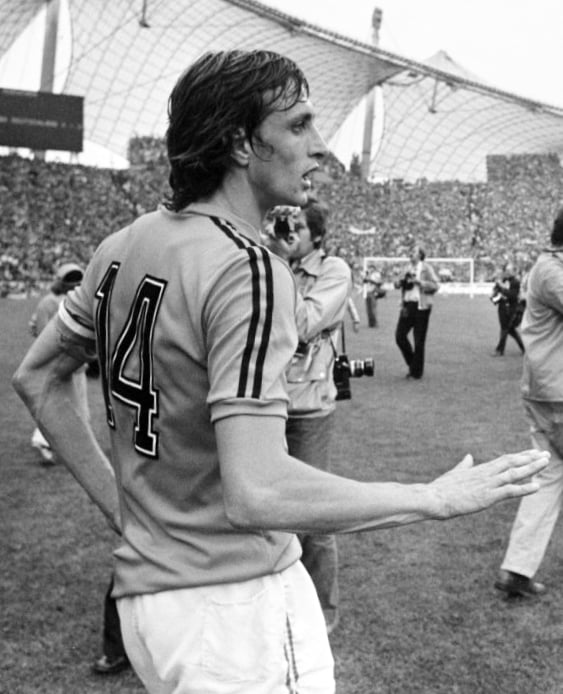
Cruyff wearing number 14, the number most identified with him.[304]
Until the 1990s, players did not have fixed numbering — except in some short competitions like the World Cup or European Championship where players were given a designated number. The starting players usually wore jerseys from 1 to 11 and the substitutes, from 12 to 16. Cruyff's usual number was 9.[304]
On 30 October 1970, Cruyff was coming back from a long-time injury to play Ajax's bitter rivals PSV. However, in the locker room before the match, teammate Gerrie Muhren couldn't find his jersey number 7. Cruyff offered his shirt to Muhren and went to the basket to pick another one at random. It happened to be the number 14.[304] Ajax won 1–0 and Cruyff suggested they keep the same numbers to the following game — according to Muhren, on an interview to Voetbal International, it was a form to challenge the Dutch Football Association.[304] From then on, Cruyff kept using the number 14 for Ajax and Netherlands national team when he was allowed to.[10][304]
In the 1974 FIFA World Cup, Netherlands' head coach Rinus Michels wanted his squad to wear numbers alphabetically. As Cruyff was the first player on roster, he would be number 1, but he refused and insisted to wear his lucky number 14.[304] Forward Ruud Geels ended up with the No 1 shirt while goalkeeper Jan Jongbloed played as the number 8.
Although the number 14 had become a trademark for Cruyff, he could be seen wearing his old number 9 on other occasions, like on most of his career for FC Barcelona, because the league demanded starting players were numbered 1 to 11,[305] or for Netherlands in the 1976 European Championship. In 2007, Ajax retired Cruyff's number 14.[304]
Relations with others
Cruyff had remained a highly controversial figure throughout his life. Cruyff's relationships with Ajax, Barça, and KNVB (Royal Dutch Football Association) were turbulent for some time, especially in his later years. Also, in his native Netherlands, there has been always a love-hate relationship between Cruyff and his fellow countrymen.[175] There was a long-standing feud between Cruyff and Louis van Gaal, though never confirmed publicly by both sides.[306][307] He also often criticised José Mourinho for his defensive-based coaching philosophy, stated, "José Mourinho is a negative coach. He only cares about the result and doesn't care much for good football." As David Winner notes, "Cruyff has had many enemies and critics over the years."[143] He has been accused of being arrogant, greedy,[175] intolerant, despotic, "too idealistic, too stubborn, insufficiently interested in defending and simply too difficult a personality. He loves an argument, and his conflict-model method of working can be bruising."[143] And Winner concludes that, "With his belief in the "conflict model" – the idea that you got the best out of people by provoking fights and thereby raising levels of excitement and adrenaline – Cruyff made enemies almost as easily as he generated delight. Battles with club presidents and teammates led to ruptures, especially at Ajax and Barcelona, the two clubs that defined his career."[163]
Criticism
Cruyff was also well known for his vocal criticism and uncompromising attitude. A perfectionist, he always had a strong opinion about things and was even loyal to his principles more than any thing else in the football world.[308] As an outspoken and critical visionary, he strongly criticized the Netherlands' style of play at the 2010 World Cup. "Who am I supporting? I am Dutch but I support the football that Spain is playing. Spain's style is the style of Barcelona... Spain, a replica of Barça, is the best publicity for football", Cruyff wrote in his weekly column for the Barcelona-based newspaper El Periodico, prior to the final match.[309]
Until the early 2010s, Barcelona had mounting debts, built up over the past few seasons, a situation that forced the club to push through an emergency bailout loan of €150 million. The Qatar Foundation, run by Sheikha Mozah, became the first shirt sponsor in Barcelona's 111-year history. The club had previously used UNICEF's logo on the front of its shirts.[310] In 2011, incoming Barcelona president Sandro Rosell agreed the deal for a period of five seasons, with the club receiving €30 million each year, starting on 1 July 2011 and running until 30 June 2016, plus bonuses for trophies won that could total €5m.[311] Writing in his El Periodico column, Cruyff slammed the deal, "We are a unique club in the world, no one has kept their jersey intact throughout their history, yet have remained as competitive as they come... We have sold this uniqueness for about six percent of our budget. I understand that we are currently losing more than we are earning. However, by selling the shirt it shows me that we are not being creative, and that we have become vulgar."[312]
In an interview with The Guardian's Donald McRae in 2014, Cruyff said about football's lost values and how money had eroded the game's purity, "Football is now all about money. There are problems with the values within the game. This is sad because football is the most beautiful game. We can play it in the street. We can play it everywhere. Everyone can play it whether you're tall or small, fat or thin. But those values are being lost. We have to bring them back."[313]
Personal life
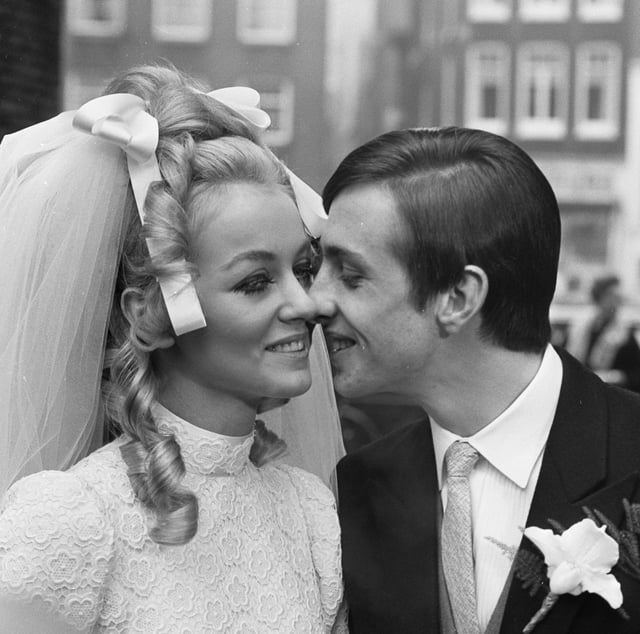
Cruyff and Danny Coster getting married on 2 December 1968
At the wedding of Ajax teammate Piet Keizer, on 13 June 1967, Cruyff met his future wife, Diana Margaretha "Danny" Coster (b. 1949). They started dating, and on 2 December 1968, at the age of 21, he married Danny. Her father was Dutch businessman Cor Coster who also happened to be Cruyff's agent. He was also credited with engineering Cruyff's move to FC Barcelona in 1973. The marriage is said to have been happy for almost 50 years.[314] Contrary to his well-known strong personality and superstar status, Cruyff led a relatively quiet private life beyond the world of football.[315] A highly principled, strong-minded and devoted family man, Cruyff's football career, both as a player and as a manager, was considerably influenced by his family, in particular his wife Danny.[316][317] He and Danny had three children together: Chantal (16 November 1970), Susila (27 January 1972), and Jordi (9 February 1974). The family has lived in Barcelona since 1973, with a six-year interruption from December 1981 to January 1988 when they lived in Vinkeveen, the Netherlands.[318]
In 1977, Cruyff announced his decision to retire from international football at the age of 30, despite still being lean and wiry, after helping the country qualify for the 1978 World Cup.[319] This move, shrouded in mystery and met with disbelief back in late 1977, was only finally stripped of its mystique in 2008, when Cruyff explained his decision in an interview with Catalunya Radio. It was while still living in Barcelona as a player in late 1977, Cruyff and his family became the victims of an armed attacker who forced his way into his flat in Barcelona.[320] And the man who was then the ultimate football superstar was confronted with the choice between family values and a highly promising World Cup glory at the end of his international career. But for Cruyff, family comes first. In the interview with Catalunya Radio, he said that the attempted kidnap was the reason he decided not to go to the World Cup in Argentina in 1978. As he recalled, "You should know that I had problems at the end of my career as a player here and I don't know if you know that someone [put] a rifle at my head and tied me up and tied up my wife in front of the children at our flat in Barcelona. The children were going to school accompanied by the police. The police slept in our house for three or four months. I was going to matches with a bodyguard. All these things change your point of view towards many things. There are moments in life in which there are other values. We wanted to stop this and be a little more sensible. It was the moment to leave football and I couldn't play in the World Cup after this."[321]
Cruyff named his third child after the patron saint of Catalonia, St Jordi, commonly known in English as Saint George of Lydda. This was seen as a provocative gesture towards the then Spanish dictator General Franco, who had made all symbols of Catalan nationalism illegal. Cruyff had to fly his son back to the Netherlands to register his birth as the name "Jordi" had been banned by the Spanish authorities. Cruyff's decision to go to such great lengths to support Catalan nationalism is part of the reason he is a hero to Barcelona supporters and Catalan nationalists.[322]
Jordi Cruyff has played for teams such as Barcelona (while father Johan was manager), Manchester United, Alavés and Espanyol. His grandson, Jesjua Angoy, plays at Dayton Dutch Lions. The younger Cruyff wears "Jordi" on his shirt to distinguish himself from his famous father, which also reflects the common Spanish practice of referring to players by given names alone or by nicknames. Pep Guardiola, Ronald Koeman, and Joan Laporta were among Cruyff's closest friends.[269] Estelle Cruijff, a niece of Cruyff, was married to Ruud Gullit for 12 years (2000–2012).[323][324]
Religious views
Cruyff once described himself as "not religious" and criticized the practices of devoutly Catholic Spanish players: "In Spain all 22 players make the sign of the cross before a game; if it worked, every game would be a tie."[325] That widely quoted statement earned him a place on lists of the world's top atheist athletes. But in the 1990s, Cruyff told the Dutch Catholic radio station RKK/KRO that as a child he attended Sunday school, where he was taught about the Bible, and that while he didn't go to church as an adult, he believed "there's something there."[326] The Dutch evangelical broadcaster EO posted an interview conducted before Cruyff's death with his friend Johan Derksen, the editor-in-chief of Voetbal International magazine. "People don't know the real Johan Cruyff", Derksen said. "I have on occasion had beautiful conversations with him about faith, because we both went to the same kind of schools and learned about the Bible. And it stays with you."[327][328]
Cruyff is also said to have had an attachment to Jewish culture, having grown up in the Amsterdam municipal Betondorp populated by a sizeable Jewish community, and more prevalently because of his lifelong connections with Ajax Amsterdam – a football club with such strong Dutch Jewish influences that some have even dubbed it a "Jewish club".[329][330][331]
Quotes
"Every trainer talks about movement, about running a lot. I say don't run so much. Football is a game you play with your brain. You have to be in the right place at the right moment, not too early, not too late."[105]
"In my teams, the goalie is the first attacker, and the striker the first defender."[258]
"Every disadvantage has its advantage."[143]
"If you can't win, make sure you don't lose."[143]
"Quality without results is pointless. Results without quality is boring."[117]
"Winning is an important thing, but to have your own style, to have people copy you, to admire you, that is the greatest gift."[116]
Illness, death and tributes
He has enriched and personified our football. He was an icon of the Netherlands. Johan Cruijff belonged to all of us. —King Willem-Alexander of the Netherlands pays tribute following Cruyff's death.[332]
Football has lost a man who did more to make the beautiful game beautiful than anyone in history.— Former English international Gary Lineker[333]
Cruyff had always been a heavy smoker from his boyhood until he underwent an emergency bypass operation in 1991. After giving up smoking following the surgery, he took to sucking lollipops when watching games.[334] He featured in a Catalan health department advert, saying, "Football has given me everything in life, tobacco almost took it all away."[334][335] After more heart trouble in 1997, he vowed never to coach again (until 2009), though he remained a vocal football critic and analyst.[336]
In October 2015 he was diagnosed with lung cancer.[337] After the news broke, tributes poured in for the former Ajax and Netherlands legend, with all Eredivisie games featuring a round of applause on 14 minutes, Cruyff's former shirt number. Ahead of their league game against Eibar at the Camp Nou (25 October 2015), Barcelona players showed their support for Cruyff by wearing orange T-shirts bearing the words 'Ànims Johan' (Catalan for 'Get well soon Johan'). Writing in his weekly De Telegraaf column, Cruyff admitted, "Often the media are an additional tax, but the last week that has been different. The way in which a reply is posted via a variety of media in my situation, was emotional and heartwarming. I am extremely proud of the appreciation shown by all responses." On his condition, Cruyff added, "Meanwhile, we have to wait. It's really annoying that it has been leaked so quickly, because the only thing I know now is that I have lung cancer. No more. Because the investigation is ongoing."[338]
In mid February 2016, he stated that he had been responding well to chemotherapy and was "winning" his cancer battle.[339][340] On 2 March 2016, he was in attendance on the second day of winter testing at the Circuit de Catalunya just outside Barcelona and visited Dutch Formula One driver Max Verstappen. Cruyff appeared to be in good spirits and it is believed this was the last time he was seen in public.[341][342][343] On the morning of 24 March 2016, in a clinic in Barcelona, Cruyff died at the age of 68, surrounded by his wife, children, and grandchildren.[344] His lung cancer had metastasized to his brain and a week before his death he had begun to lose his ability to speak as well as movement on his left side. He was cremated in Barcelona within 24 hours[345] following his death. A private ceremony was held, attended only by his wife (Danny), children (Chantal, Susila, and Jordi), and grandchildren.[346][347][348]
Today football has lost one of its best ever players and ambassadors. I am very sad because Johan was my childhood hero, my idol and my friend.— Former UEFA president Michel Platini pays tribute to Cruyff.[349]
Cruyff's death shocked the football world.[350][351][352] Within a week after his death, there were numerous individuals (including players and managers) and organizations (including clubs) paying tribute to him, especially via social media.[170][353][354][355] Thousands of Barcelona fans passed through the memorial to Cruyff, opened inside the Camp Nou stadium, to pay tribute. Cruyff's greatness was even respected by his rivals.[356][357][358][359] Former Barcelona president Sandro Rosell, who did not have a good relationship with Cruyff, was among the early visitors to the memorial.[360] Real Madrid president Florentino Pérez led a Real Madrid delegation to the memorial, including former players Emilio Butragueño and Amancio Amaro.[361] Former Real Madrid president Ramón Calderón said of Cruyff: "He can be seen as a revolutionary, a dreamer, a visionary, and an innovator who changed the idea of a game in which strength was the primary consideration to another one based, and focused, on ability and technique, giving birth to what has been called "tiki-taka." He used to say that football should be played with the brain... I met him a few times after he left football, always playing golf, a sport he loved. He would always talk about football in the same way he did when he was playing and coaching—with plenty of passion and excitement. A legend has gone but he has left an important legacy."[258][362]
A friendly match between the Netherlands and France was held on the day after Cruyff's death. The play (at the Amsterdam Arena) was stopped in the 14th minute as players, staff, and supporters gave a minute's applause for Cruyff, who wore the number 14 shirt for his country. Mascots from both teams took to the pitch wearing Netherlands national team shirts adorned with Cruyff's number 14 on the front, while there were numerous banners in the spectators' stands bearing the simple message, "Johan Bedankt" ("Thank you Johan").[363]
Ahead of the El Clásico against Real Madrid (2 April 2016), Barcelona announced plans for five special tributes to the late club legend:
1.) A mosaic formed by the 90,000 fans inside Camp Nou carrying the words 'Gràcies Johan' (Catalan for 'Thank you, Johan')
2.) The words 'Gràcies Johan' would replace the World Club champions badge on the front of the Barcelona players' shirts
3.) Children wearing T-shirts with the words 'Gràcies Johan' would accompany Barça's and Madrid's players on to the pitch at the beginning of the game. The logo of the Johan Cruyff Foundation would feature on the back of the T-shirts
4.) The presence of all eight living (past and present) Barcelona presidents: Agustí Montal Galobart, Raimon Carrasco, Josep Lluís Núñez, Joan Gaspart, Enric Reyna, Joan Laporta, Sandro Rosell and Josep Maria Bartomeu
5.) A commemorative video honouring Cruyff's life would be shown on the big screens at Camp Nou stadium.[364][365] An open letter signed by Barcelona's eight current and previous presidents read: "With Cruyff we began to play differently, breaking new ground and innovating. With him, both as a player and coach, we established our own style on the field, what is traditionally known as 'total football,' the Barça style everyone admires. The arrival of Cruyff altered the history of Barça. He contributed decisively to a change of mentality. He got us to keep our heads up and to see that no opponent was invincible, that we could attain what we were aiming for. Cruyff was an icon who explained, better than anyone, that Barça is more than a club. ... Without Cruyff's unabashed and non-conformist spirit, we quite possibly wouldn't have become the greatest club in the world."[366][367]
Former Israeli president and prime minister Shimon Peres paid tribute to Cruyff as a cultural figure and writing on Facebook: "Johan was more than just a great soccer player. He was a role model who promoted world peace. He brought the values of education into the game of football and proved that on the field, everyone is equal – Jews, Muslims, and Christians – that running fast and playing well will lead to victory in spite of discrimination and racism."[164]
Career statistics
Player
Club
| Club[368] | Season | League | Cup1 | Continental2 | Other3 | Total | ||||||
|---|---|---|---|---|---|---|---|---|---|---|---|---|
| Division | Apps | Goals | Apps | Goals | Apps | Goals | Apps | Goals | Apps | Goals | ||
| Ajax | 1964–65 | Eredivisie | 10 | 4 | 0 | 0 | — | 10 | 4 | |||
| 1965–66 | 19 | 16 | 4 | 9 | — | 23 | 25 | |||||
| 1966–67 | 30 | 33 | 5 | 5 | 6 | 3 | — | 41 | 41 | |||
| 1967–68 | 33 | 27 | 5 | 6 | 2 | 1 | — | 40 | 34 | |||
| 1968–69 | 29 | 24 | 3 | 3 | 10 | 6 | 1 | 1 | 43 | 34 | ||
| 1969–70 | 33 | 23 | 5 | 6 | 8 | 4 | — | 46 | 33 | |||
| 1970–71 | 25 | 21 | 6 | 5 | 6 | 1 | — | 37 | 27 | |||
| 1971–72 | 25 | 21 | 6 | 5 | 6 | 5 | — | 37 | 31 | |||
| 1972–73 | 32 | 17 | 4 | 3 | 6 | 3 | 4 | 3 | 46 | 26 | ||
| 1973–74 | 2 | 3 | 0 | 0 | 0 | 0 | 0 | 0 | 2 | 3 | ||
| Barcelona | 1973–74 | Primera División | 26 | 16 | — | 0 | 0 | — | 26 | 16 | ||
| 1974–75 | 30 | 7 | — | 8 | 0 | — | 38 | 7 | ||||
| 1975–76 | 29 | 6 | — | 9 | 2 | — | 38 | 8 | ||||
| 1976–77 | 30 | 14 | — | 7 | 5 | — | 37 | 19 | ||||
| 1977–78 | 28 | 5 | 7 | 1 | 10 | 5 | — | 45 | 11 | |||
| Los Angeles Aztecs | 1979 | NASL | 22 | 14 | — | 4 | 1 | 26 | 14 | |||
| Washington Diplomats | 1980 | 24 | 10 | — | 2 | 0 | 26 | 10 | ||||
| Levante | 1980–81 | Segunda División | 10 | 2 | 0 | 0 | — | 10 | 2 | |||
| Washington Diplomats | 1981 | NASL | 5 | 2 | — | 5 | 2 | |||||
| Ajax | 1981–82 | Eredivisie | 15 | 7 | 1 | 0 | 0 | 0 | — | 16 | 7 | |
| 1982–83 | 21 | 7 | 7 | 2 | 2 | 0 | — | 30 | 9 | |||
| Feyenoord | 1983–84 | 33 | 11 | 7 | 1 | 4 | 1 | — | 44 | 13 | ||
| Career total | 511 | 297 | 60 | 46 | 84 | 36 | 10 | 4 | 667 | 383 | ||
1.^ Includes KNVB Cup and Copa del Rey.
2.^ Includes European Cup and Fairs Cup.
3.^ Includes Intertoto Cup, UEFA Super Cup, Intercontinental Cup and NASL Play Offs.
International
| Year | Apps | Goals |
|---|---|---|
| 1966 | 2 | 1 |
| 1967 | 3 | 1 |
| 1968 | 1 | 0 |
| 1969 | 3 | 1 |
| 1970 | 2 | 2 |
| 1971 | 4 | 6 |
| 1972 | 5 | 5 |
| 1973 | 6 | 6 |
| 1974 | 12 | 8 |
| 1975 | 2 | 0 |
| 1976 | 4 | 2 |
| 1977 | 4 | 1 |
| Total | 48 | 33 |
International goals
| Date | Venue | Opponent | Score | Result | Competition | |
|---|---|---|---|---|---|---|
| 1 | 7 September 1966 | Rotterdam, Netherlands | 2–0 | 2–2 | UEFA Euro 1968 qualifying | |
| 2 | 13 September 1967 | Amsterdam, Netherlands | 1–0 | 1–0 | ||
| 3 | 26 March 1969 | Rotterdam, Netherlands | 1–0 | 4–0 | FIFA World Cup 1970 qualifying | |
| 4 | 2 December 1970 | Amsterdam, Netherlands | 1–0 | 2–0 | Friendly | |
| 5 | 2–0 | |||||
| 6 | 24 February 1971 | Rotterdam, Netherlands | 3–0 | 6–0 | UEFA Euro 1972 qualifying | |
| 7 | 4–0 | |||||
| 8 | 17 November 1971 | Eindhoven, Netherlands | 1–0 | 8–0 | ||
| 9 | 7–0 | |||||
| 10 | 8–0 | |||||
| 11 | 1 December 1971 | Amsterdam, Netherlands | 1–0 | 2–1 | Friendly | |
| 12 | 16 February 1972 | Athens, Greece | 3–0 | 5–0 | ||
| 13 | 5–0 | |||||
| 14 | 30 August 1972 | Prague, Czechoslovakia | 1–0 | 2–1 | ||
| 15 | 1 November 1972 | Rotterdam, Netherlands | 4–0 | 9–0 | FIFA World Cup 1974 qualifying | |
| 16 | 8–0 | |||||
| 17 | 2 May 1973 | Amsterdam, Netherlands | 3–2 | 3–2 | Friendly | |
| 18 | 22 August 1973 | 2–0 | 5–0 | FIFA World Cup 1974 qualifying | ||
| 19 | 5–0 | |||||
| 20 | 29 August 1973 | Deventer, Netherlands | 2–0 | 8–1 | ||
| 21 | 4–0 | |||||
| 22 | 12 September 1973 | Oslo, Norway | 1–0 | 2–1 | ||
| 23 | 26 June 1974 | Gelsenkirchen, West Germany | 1–0 | 4–0 | FIFA World Cup 1974 | |
| 24 | 4–0 | |||||
| 25 | 3 July 1974 | Dortmund, Germany | 2–0 | 2–0 | ||
| 26 | 4 September 1974 | Stockholm, Sweden | 1–0 | 5–1 | Friendly | |
| 27 | 25 September 1974 | Helsinki, Finland | 1–1 | 3–1 | UEFA Euro 1976 qualifying | |
| 28 | 2–1 | |||||
| 29 | 20 November 1974 | Rotterdam, Netherlands | 2–1 | 3–1 | ||
| 30 | 3–1 | |||||
| 31 | 22 May 1976 | Brussels, Belgium | 2–1 | 2–1 | ||
| 32 | 13 October 1976 | Rotterdam, Netherlands | 2–1 | 2–2 | FIFA World Cup 1978 qualifying | |
| 33 | 26 March 1977 | Antwerp, Belgium | 2–0 | 2–0 |
Managerial
Honours
Player
- Ajax[10]
Eredivisie: 1965–66, 1966–67, 1967–68, 1969–70, 1971–72, 1972–73, 1981–82, 1982–83
KNVB Cup: 1966–67, 1969–70, 1970–71, 1971–72, 1982–83
European Cup: 1970–71, 1971–72, 1972–73
Intercontinental Cup: 1972
- Barcelona[10]
La Liga: 1973–74
Copa del Rey: 1977–78
- Feyenoord
Eredivisie: 1983–84
KNVB Cup: 1983–84
- International
FIFA World Cup Runner-up: 1974
UEFA European Championship Third place: 1976
Manager
- Ajax[10]
KNVB Cup: 1985–86, 1986–87
UEFA Cup Winners' Cup: 1986–87
- Barcelona[10]
La Liga: 1990–91, 1991–92, 1992–93, 1993–94
Copa del Rey: 1989–90
Supercopa de España: 1991, 1992, 1994
European Cup/UEFA Champions League: 1991–92
UEFA Cup Winners' Cup: 1988–89
UEFA Super Cup: 1992
Individual
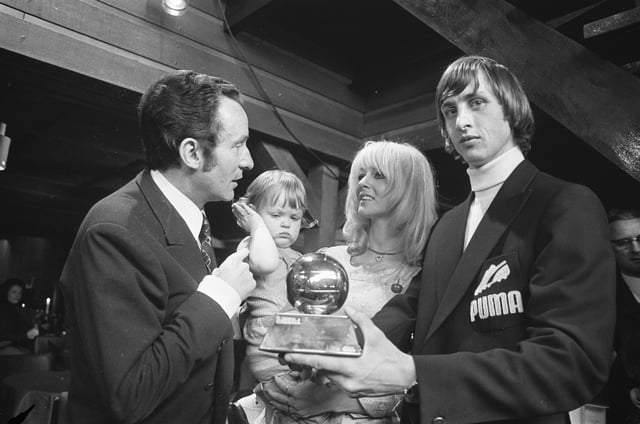
Cruyff receiving the 1971 Ballon d'Or
Player[10]
Ballon d'Or: 1971, 1973, 1974; Third place: 1975[2]
Dutch Sportsman of the Year: 1973, 1974
FIFA World Cup Golden Ball: 1974[372]
FIFA World Cup All-Star Team: 1974[373]
IOC European Footballer of the Season: 1970/71, 1972/73[374]
Don Balón Award: 1977, 1978[375]
North American Soccer League MVP: 1979
FIFA World Cup All-Time Team: 1994[376]
FIFA World Cup Dream Team: 2002[377]
World Team of the 20th Century[376]
FIFA 100[378]
World Soccer's Greatest XI of All Time: 2013[379]
World Soccer's The Greatest Players of the 20th Century: #3
France Football's Player of the Century: #3
IFFHS European Player of the Century: #1[13]
IFFHS World Player of the Century: #2
IFFHS Legends[380]
Manager
World Soccer Awards Manager of the Year: 1987
Don Balón Award for Coach of the Year: 1991, 1992
Onze d'Or for Coach of the Year: 1991, 1992
European Coach of the Season: 1991–92
Orders and further honours
In 1974, Cruyff was appointed Knight of the Order of Orange-Nassau.
In 2002, Cruyff was promoted to Officer of the Order of Orange-Nassau.
In November 2003, to celebrate UEFA's Jubilee, he was selected as the Golden Player of the Netherlands by the KNVB as their most outstanding player of the past 50 years.[381]
On 22 May 2006, Cruyff was presented a Lifetime Achievement Award for his contribution to football by Laureus in their annual World Sports Awards.[382]
In April 2016, Cruyff was posthumously awarded the Laureus Spirit of Sport Award, which was accepted by his son Jordi.[383]
Cruyff received a lifetime achievement award from the KNVB in August 2006.[384][385]
In 2006, Cruyff played in Dennis Bergkamp's Testimonial as a second-half substitute with Ajax.[386]
On 18 April 2007, Ajax decided to retire the number 14 shirt in honour of Cruyff and in celebration of his birthday.[387]
In 2010, Cruyff was presented the FIFA Order of Merit (highest honour awarded by FIFA) for his significant contribution to football.[10]
In 2010, Cruyff entered in the FICTS "Hall of Fame" and was awarded with "Excellence Guirlande D'Honneur".[388]
In 2013, Cruyff was recognised with the UEFA President's Award[389]
On 29 March 2016, the Prime Minister of Spain awarded Cruyff with the Gold Medal of the Royal Order of Sporting Merit.[390]
On 25 October 2017, the Amsterdam Arena was renamed Johan Cruyff Arena.[391]

